

Your secret sauce for private brand success
Global Tissue Group’s commitment to keeping products in stock and on the shelf helps retailers turn everyday paper goods into trusted, high-performing brands.
With U.S. manufacturing and custom solutions, we keep your stores supplied— and your customers satisfied.
Let’s unlock your aisle’s potential.






What The Hell Is Going On In The US?
My wife cautions me not to share my political views in this space. And I usually take her advice, or at the very least, tone things down. So consider this toned-down.
I’m at my laptop, wondering what topics are appropriate for this issue. Could it be the burst of flowers we enjoy every spring? Or maybe that the summer holidays are right around the corner. How about that we are all here, gathered at the world’s largest private label event?
Or…What the hell is going on in the US? (I suspect this may come up over the next few days)
One might think that living in the US provides some sharper insight, but I can assure you, it only provides louder noise. FOX News believes President Trump is essentially a saint, certainly infallible. MSNBC suggests he’s the devil and destroyer of democracy. CNN tries to play the middle, but they lean in a clear direction. Desperate for a scintilla of objectivity, I often get my “news” on the US from the BBC.
Same goes for the NY Times, or the Wall Street Journal, Washington Post…etc. The extremes simply shout at each other. Trench warfare. Throw a grenade and duck (as in take cover, not actually throwing a duck with the grenade). As for Social Media, there’s nothing social about it.
But I’m convinced there’s light at the end of the tunnel and that whatever is about to upend the world order today is likely to be different tomorrow. So, should I stop paying attention to the news? That seems irresponsible. Or do I get consumed by the irrationality? Which seems, well, irrational.
Here’s what I’ll do, focus on business, and the fact that all the recent shocks to our socio-economic system have done one thing for the private label industry…make it stronger.
Take this list of headline-dominating events from the 21st century:
Dot.Com Bubble Bursts
Housing Bubble Pops
The Great Recession
Covid-19
Inflation and Supply Chain “Shortages”
What do they all have in common?
The private label industry not only survived them, it excelled. After each, growth accelerated, consumer loyalty increased, and product quality just got better and better. It almost seems as if the best of our industry comes from the worst of times.
And that’s why I have hope that the current tariff tumult will, rather than slow us down, make us even stronger. We’ve passed the midway mark en route to building a trillion-dollar industry. We’re worth even more that Elon Musk. (sorry)
So let’s not let a little chaos in the US get in our way. It’s simply not in our nature to do so.
Please come by and share your thoughts about this during PLMA Amsterdam, we’re at stand 2.C15
Phillip Russo Founder / Editor phillip@globalretailmag.com




Bring the taste of Italy to your customers with our authentic Altamura focaccia, made with durum wheat semolina and gently topped with juicy cherry tomatoes and olives
Contact us today to learn more: gourmetbreads@oropan.it



With its crispy crust, Mediterranean ingredients and exceptional flavor, our focaccia will elevate your bakery’s performance to new heights.









13 I
Phillip Russo EDITOR / PUBLISHER phillip@globalretailmag.com
Where Retailers Suppliers Meet &

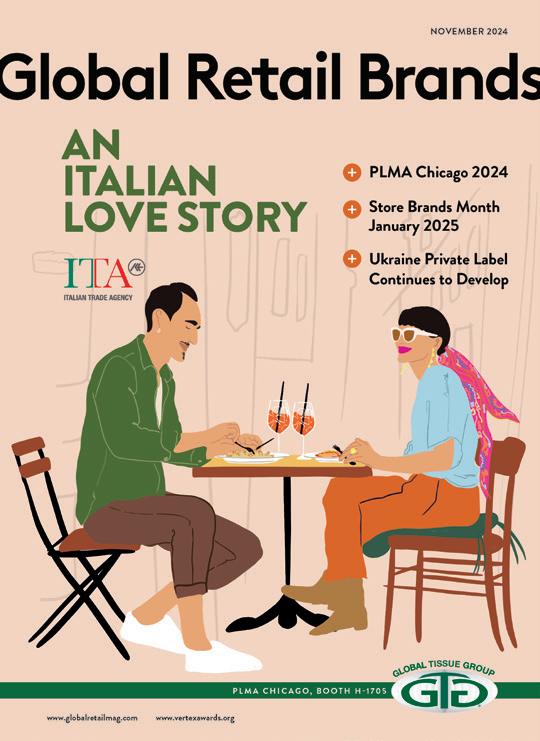




2 OF 4
Jacco van Laar BRAND AMBASSADOR jacco@globalretailmag.com
Melissa Subatch CREATIVE DIRECTOR info@melissasubatchdesign.com
Andrew Quinn DIGITAL DIRECTOR andrew.quinniii@gmail.com
Luisa Colombo EUROPEAN DIRECTOR luisa@globalretailmag.com
Ana Maria Jimenez Aguilar BUSINESS DEVELOPMENT ana@globalretailmag.com
Sabine Geissler GREENTASTE.IT Italian Business Development s.geissler@greentaste.it
CONTRIBUTORS
Perry Seelert Emerge perry@emergefromthepack.com
Christopher Durham Velocity Institure cdurham@retailbrandsinstitute.org
Maria Dubuc
Marketing By Design mdubuc@mbdesign.com
Hans Kraak Kraak Media kraakmedia@gmail.com
Elena Sullivan sullivan.elena@gmail.com
Tom Prendergast PLMA tprendergast@plma.com
Koen A. M. De Jong IPLC kdejong@iplc-europe.com
Published, Trademarked and all rights reserved by: Kent Media
Phillip Russo, Principal 225 1st Ave N. / Unit 3501 St. Petersburg, FL 33701 Tel. +1 917 743 6711 All rights reserved under the Library of Congress. No part of this publication may be
Advertising
Global Retail Brands is published 4 times a year.
Editorial Submissions phillip@globalretailmag.com
Advertising Inquiries – EUROPE luisa@globalretailmag.com
phillip@globalretailmag.com • ana@globalretailmag.com
Subscription Information phillip@globalretailmag.com www.globalretailmag.com


futureprivatelabels.pl





LUISA COLOMBO
Luisa is an International Sales specialist with over 30 years of experience in the development organization and sales of products and services in an international environment. She has acquired extensive skills in promotion and advertising for the private label sector. Expert in the development of innovative sectors and products. For Global Retail Brands she shares the working group with Ms. Ana Maria Jimenez.

JILL DEARING
Jill Dearing, founder & CEO of Dearing & Company, leverages her extensive experience in the grocery, food, and private brand industries to drive innovative solutions and strategic transformations. She can be reached via email at jdearing@dearingco.com or visit www.dearingco.com.

KOEN DE JONG
Koen has extensive management experience in the private label manufacturing industry in Germany, France, the United Kingdom and the Netherlands. He has been involved in numerous M&A transactions in the Benelux. His private label strategy and business planning involvement includes company analysis and benchmarking, board consulting and the participation in supervisory boards. He speaks fluent English, German, French and Dutch (mother tongue).

MARIA DUBUC
President of MBD, is a creative and workflow expert in the retail landscape, Maria’s 30-year career translates branding experiences into eye-catching design that is unique and distinct for each client. She has created new private brands and redesigned/repositioned existing brands with leading retailers, while also implementing workflow management systems specifically tailored to the clients’ needs. Current clients include The Home Depot, Smart & Final, PetSmart, 7-Eleven, PriceSmart, BJ’s Wholesale Club, Sprouts Farmers Market, WinCo Foods, Natural Grocers and more.

CHRISTOPHER DURHAM
President of the Velocity Institute.
Prior to this he founded the groundbreaking site My Private Brand. He is the co-founder of The Vertex Awards. He began his retail career building brands at Food Lion and Lowe’s Home Improvement. Durham has worked with retailers around the world, including Albertsons, Family Dollar, Petco, Staples, Office Depot, Best Buy, Metro Canada. Durham has published seven definitive books on private brands, including Fifty2: The My Private Brand Project and Vanguard: Vintage Originals.

EUGENE GERDEN
is a freelance writer who writes on a wide range of international topics, from commerce to chemistry and from wine to aviation. He has contributed to many publications, including Decanter, International Aviation News, Chemistry World and The Journal of Commerce. For Decanter, he has covered several stories on wine markets and production in Russia, Georgia and Bulgaria. gerden.eug@gmail.com

REBECCA HAMILTON
Rebecca is the CEO of award-winning Fish Agency and sister agency Whitespace Brands Inc. With over 30 years of experience, she has established herself as one of North America’s leaders in the fields of strategic branding, retail design, and communications for clients in the retail sector. Under Rebecca’s oversight, the Fish Agency brings brands to life at retail and has consistently delivered high ROI-generating retail experiences for its clients. She mentors and leads highly experienced and integrated teams that provide store design, package design for CPG and private brands, digital/social initiatives, “phygital” experiences, and advertising services.

HANS KRAAK
Hans Kraak is educated in biology and journalism and wrote three books about nutrition and health. He worked for the Dutch ministry of Agriculture, Nature and Food quality and the Netherlands Nutrition Centre. As editor in chief he publishes in the Dutch Magazine for Nutrition and Dietetics, as a food and wine writer he published in Meininger’s Wine Business International and reports for PLMA Live EU and PLMA USA.

PERRY SEELERT
A retail branding and marketing expert, with a passion for challenging conventional strategy and truths. Perry is the Strategic Partner and Co-founder of Emerge, a strategic marketing consultancy dedicated to helping Retailers, Manufacturers and Services grow exponentially and differentiate with purpose.

MAY
PLMA’S WORLD OF PRIVATE LABEL
Amsterdam 20 - 21 MAY www.plmainternational.com
JUNE
IDDBA
New Orleans, LA
1 - 3 JUNE www.iddba.org
FOOD TAIPEI
Taipei, Taiwan
26 - 29 JUNE
foodtaipei.com.tw/en



SUMMER FANCY FOOD SHOW
New York, NY
29 JUNE - 1 JULY www.specialtyfood.com

JULY
COSMOPROF
NORTH AMERICA
Las Vegas, NV
15 - 17 JULY
www.cosmoprofnorthamerica.com

OCTOBER
ANUGA
Cologne, Germany
4 – 8 OCTOBER www.anuga.com

PLMA’S PRIVATE LABEL SUMMIT
Copenhagen, Denmark 28 – 29 OCTOBER www.plmainternational.com

NOVEMBER
COSMOPROF ASIA
Hong Kong
11 – 14 NOVEMBER www.cosmoprof-asia.com

PLMA’S US TRADE SHOW
Chicago, IL 16 – 18 NOVEMBER www.plma.com

JANUARY 2026
MARCA BOLOGNA
Bologna, Italy 13 – 15 JANUARY www.marcabybolognafiere.com/en



PLMA’s 2025 PRIVATE LABEL TRADE SHOW 16-18 NOVEMBE R I CHICAGO
Thousands of Great Products Under One Roof!
The US is at a watershed moment in the recognition of the strategic importance of private label by the media, the financial community and, most importantly, by the C-suite at retailers. To ensure growth, the industry will assemble to explore emerging opportunities, particularly in thriving categories like premium skincare, wine & spirits, housewares, ethnic & gourmet food, first aid & devices, and snacks & confectionery. “Store Brands Marketplace: PLMA’s 2025 US Private Label Trade Show,” 16-18 November, Chicago, will present thousands of food and nonfood products under one roof. For more information about the Show or to exhibit, visit plma.com or email exhibitor@plma.com








PLMA’s 2025 Amsterdam Trade Show: The Biggest Global Event for Private Label, Shaping Future Trends
The Private Label Manufacturers Association (PLMA) is set to host the largest and most international trade show in its history this May at the RAI Convention Exhibition Centre in Amsterdam. The 2025 World of Private Label International Trade Show will bring together more than 30.000 private label professionals from over 125 countries, making it the industry’s key global gathering.
With 3,160 exhibitors from 75 countries showcasing a diverse range of food and non-food products, this year’s event underscores the growing importance and interconnectedness of the private label industry on a global scale. Buyers from across the globe, including major retailers, wholesalers, e-commerce leaders, and distributors, will gather in Amsterdam to discover the latest products, trends, and innovations driving the private label industry.


19 MAY MAIN HIGHLIGHTS:
Exclusive Seminars & Workshops
PLMA will host a series of exclusive seminars and workshops. These sessions will focus on Navigating Trends, Market Insights, and Innovation in Private Label, as well as Building Strategic Partnerships & Navigating Modern Procurement for Long-Term Success. The seminars and workshops are free and open to all registered visitors and exhibitors. Speakers taking the stage include representatives from Jumbo Supermarkets, NielsenIQ, and Daymon. In addition, the winners of PLMA’s 2025 Salute to Excellence Awards, the best of the best in private label, will be announced.
New Product Expo in the Idea Supermarket:
Discover unprecedented innovation from exhibiting manufacturers, showcasing more groundbreaking products than ever before. Now is the time for forward-thinking ideas, as retailers and manufacturers collaborate to drive innovation by creating exciting solutions for the private label industry. These cutting-edge products can be found across the trade show floor, offering a firsthand look at the future of product development and industry trends. In the same area, Retail Trends from 64 retailers worldwide will be showcased, alongside all the retail winners.

PLMA’s World of Private Label is the world’s leading international private label hub, reflecting the growing demand for high-quality, value-driven products across all markets,”
This year’s show will bring together top manufacturers and decision-makers from every corner of the globe, creating an unmatched platform for networking, collaboration, and innovation.”
- Peggy Davies, PLMA President
The trade show will take place on 20 and 21 May and will attract international attendees from 125 countries across all continents. Now is the time to decide, as attendance is by pre-registration only.

FREE WORKSHOP & PRE-SHOW SEMINARS
Monday 19 May - 13.00 to 16.00 Forum Centre, RAI Amsterdam Convention Centre
CONCURRENT WORKSHOPS
13.00 – 14.00 (Pre-Registration Only)
Getting to Yes – Strategic Partnership & Creating Mutual Value
Success in business is built on four pillars of confidence: Personal Confidence, Sales Confidence, Strategic Confidence and Leadership Confidence
SPEAKER: Erik Aapkes, Managing Partner, Blueprint Europe
In this interactive workshop, which includes hands-on role plays, Erik will dive into the principles of the renowned ‘Getting to Yes’ model—a proven framework for building stronger business relationships and creating mutual value in every negotiation. Participants will learn how to apply this model to enhance collaboration, and drive long-term business success. A key focus of the session will be on the importance of ‘Getting a Seat at the Table’—understanding and communicating the unique value your organization brings to the conversation and answering the critical question: “Why us?”
Erik will also introduce the 7Cs framework for presenting breakthrough, innovative insights in an impactful way. Finally, the workshop will address how to approach negotiations with a collaborative mindset, where both sides work together to find win-win solutions rather than competing for advantage.
Insights into Sourcing Developments: Implications for PL Suppliers and Retailers
Understanding modern procurement to achieve long term success
SPEAKER: Marijn Overvest, Founder, Procurement Tactics
This workshop will cover the current procurement landscape and how it is rapidly evolving in response to key industry trends, including digital transformation, sustainability, and data-driven decision-making. As businesses adapt to a constantly changing environment, procurement teams must stay ahead of the curve to ensure success.
Building strong supplier-retailer relationships, which are essential for long-term success, will be another key focus of the workshop. Participants will learn the skills necessary to foster collaboration, trust, and mutual value with suppliers, ensuring both parties can thrive in a competitive marketplace.

PRE-SHOW SEMINAR PROGRAMME
14.00 – 16.00
(Free to all registrants with a 2025 badge)
MEET THE RETAILER: JUMBO
The journey of the Netherlands' secondlargest omnichannel food retailer
Jumbo’s vision on the critical role of product innovation, increasingly driven by food retailers and their private label partners
SPEAKER: Tim Hehenkamp, Director Category Management, Jumbo Supermarkets
Jumbo, a fully family-owned company, is renowned for its extensive assortment, competitive prices, and exceptional service. In its innovative Foodmarkets, Jumbo offers a unique culinary experience where new products and services are continuously tested and refined. Tim will present Jumbo’s vision on the critical role of product innovation, increasingly driven by food retailers and their private label partners rather than A-brand suppliers. As a highlight, Tim will discuss the launch of Jumbo's new food brand, 'Jumbo’s,' which delivers top-quality products at competitive prices, effectively bridging the gap between A-brands and traditional private labels.
PLMA’s
European
Private Label Market Report
A current update of the country-bycountry market share data
SPEAKER: Sebastiaan van Deth, Customer Success Consultant, NielsenIQ
Private Label volume and value shares continue to show steady growth across Europe, reflecting shifting consumer preferences and evolving market dynamics. In this session, NielsenIQ will present a comprehensive overview of the latest data trends, shedding light on the key drivers behind the continued rise of Private Label products. The presentation will also explore category-specific opportunities, highlighting areas where Private Label is thriving, and examining the strategies fueling its success. In addition, NielsenIQ will identify sectors where potential remains untapped, offering insights into where retailers and manufacturers can focus their efforts to unlock further growth.
Private
Label at the Forefront
of Trends
Daymon's report of the latest and upcoming mega and micro trends
SPEAKER: Anne Ravalet, Senior Manager Trends and Innovation, Daymon International
In today’s competitive landscape, every product on the market must be designed to meet consumer needs. As consumers change, the meaning of consumer trends also evolves, significantly impacting our industry, particularly in identifying product opportunities that drive product development. Some trends persist and evolve, while others emerge and reshape market dynamics in order to drive PB development.
Daymon TrendwheelTM is Daymon proprietary “futures” forecasting tool that identifies, defines and tracks the evolution of global consumer behaviour to help industry players navigate the changing retail landscape. The 20252026 Trendwheel is articulated around 45 Micro Trends, focused consumer behaviours, organized around 6 Mega Trends, that are broad movements that last for longer periods of time.
During this session, Daymon will share key insights from their latest Trendwheel update, highlighting important shifts in consumer trends that will influence the development of Private Brand products; the presentation will cover the rationale behind the product concepts and specific product executions.
ANNOUNCING THE WINNERS OF 2025 INTERNATIONAL PLMA SALUTE TO EXCELLENCE AWARDS
Video Impression of the 2 testing and tasting days, selecting the best of the best in private label, revealing the winning products and honouring retailers for innovation and quality in private label products and packaging.
CONTINUED ON NEXT PAGE >
NOTABLE AT A GLANCE
PLMA’s 2025 World of Private Label International Trade Show
Organiser:
Private Label Manufacturers Association (PLMA, plmainternational.com)
Members:
More than 4.500 manufacturers from over 80 countries
Show Venue:
RAI Convention Centre, Amsterdam, The Netherlands
Show Dates:
Tuesday 20 May and Wednesday 21 May 2025
Opening Hours:
20 May: 09.00 – 18.30
21 May: 09.00 – 16.30
Exhibitor Profile:
Manufacturers of private label FMCG food and non-food products
Pavilions:
More than 70 national and regional pavilion organisers from 40 countries
New pavilions from: Bulgaria, Canada, Morocco, Scotland and Ukraine
Exhibitors:
3.160 companies from 75 countries
Surface: 45.000 net m2
Visitor Profile:
Trade professionals from 120+ countries, including buyers from supermarkets, hypermarkets, discounters, drugstores, and department stores, as well as importers and exporters, manufacturers, consultants, sales agents, and packaging & design experts
Halls:
9 Food halls and 5 Non-Food halls, covering all 3 complexes of RAI Amsterdam. Halls 1-8 and 14 accommodate the Food Section, Halls 8-12 accommodate the Non-Food Section

FOOD SECTION
Beverages
Fruits and Vegetables
Snacks Meat, Poultry and Fish
Confectionery Ready Meals
Shelf Stable Products Organic, Health and Dietary Products
Bakery Products Dairy Products
Sauces & SpreadsOils, Dressings and Seasonings
Pet Food
Ingredients and Raw Materials
NON-FOOD SECTION
OTC-Products and Healthcare
Baby Care and accessories
Feminine Hygiene
Toiletries
Cosmetics
Hair Care and Skin Care
Household Products
Paper and Plastic Products
Housewares and DIY Products
Pet Products/Accessories



Our Soluble Coffee Products
Your leading partner for retail, food industry and vending worldwide.
We are leading PL supplier for a wide range of soluble coffee solutions, liquid coffee and individual taste.








2025 International PLMA Salute to Excellence Awards For Private Labels
That Add Value to Shoppers’ Lives
Year on year, private labels are increasing their strategic value for retailers. Where national brands are merely used to compete on price, private labels have become a major distinguishing factor for retailers to show their purpose and the value they add to their shoppers’ lives.


Due to inflation and shoppers’ ongoing concerns about their budgets, affordability remains a crucial driver for private label sales. Nevertheless, retailers and their label suppliers are succeeding in their joint effort to surprise consumers. They are transforming everyday staples into upscale offerings with enhanced taste and quality. For instance, they are adding truffles to tortillas, or pierogi (small dumplings from Eastern European cuisine) with mascarpone. And how about vinegar crema with 47% prosecco? This item, introduced by the German retailer Rewe, also astonished the judges, who awarded it an International Salute to Excellence Award.
In this year’s edition, 550 new private label items (370 food items and 180 non-food items) from 65 retailers in 24 countries were considered for the highest recognition. An international panel of judges – including former retailers, chefs, marketing professionals, nutritionists and journalists – evaluated these items in intensive sessions.
The high levels of creativity and innovation allowed the judges to be very critical. 90 new private labels (58 food items and 32 nonfood items) received a Salute to Excellence Award.
90 winners by 35 retailers from 17 countries
These winners were introduced by 35 retailers from 17 countries. Most award winning private labels (20) were introduced in Germany, followed by Italy with 11 Salute-winning items. Denmark, Poland and The Netherlands share the third place in the ranking with 7 Salutewinners each, and Portugal fourth with 6 award winners. Retailers in the Czech Republic, Ireland, Spain and – the first non-European country in the ranking – South Africa complete the top 5 with 5 Salute-winning items per country. Combined, the 10 countries representing the top 5 account for 78 Salute-winners. The other awards were divided between retailers from Belgium, Latvia, Norway, South Korea, Sweden, Thailand and Ukraine.
Private label manufacturers keep raising the bar of quality, both in food and non-food.
Take-Aways From This Year’s
Competition:
• Storytelling and product presentation remain of key importance.
• Staying competitive in today’s market requires constant investment in innovation and standout packaging design, both key to the growth of the private label sector.
The top three retailers, Dirk Rossmann and REWE Group from Germany, and Biedronka from Poland, won 9, 7, and 6 awards respectively. This year’s competition demonstrated a level playing field, with strong entries across the board and a broad distribution of awards, reflecting the diversity and quality among the participating retailers.
What the Judges Say
“Private label manufacturers keep on raising the bar of quality, both in food and non-food. This applies not only to the product itself and the ingredients used, but also to packaging design.”
Another judge agrees: “Packaging design is increasingly creative and consumer-focused. I saw several appealing examples of refillable packaging in non-food and minimalistic design that really gains traction. From a packaging perspective, manufacturers need to seize every opportunity to reduce packaging, use recyclable material and design refill options. That really caters to shoppers needs.”
The jury was particularly impressed by the outstanding quality of the products presented, including those from countries outside Europe like Thailand, South Korea, China and South Africa. That said, some products posed a challenge for the European judge’s taste. “The freezedried durian submitted by a Thai retailer was clearly remarkable”, he says with a smile. Known for its
strong smell, durian fruit has lovers and haters. Learning to appreciate it, takes time and perseverance. Or, as the judge puts it with an understatement: “this is clearly a product that needs to grow on you.”
Trends In Food And Non-Food
A key trend in the food category is the ongoing rise of vegan products, not just as meat substitutes, but as independent offerings with their own identity and appeal. Also functional ingredients like adding coffee or caffeine as additions to food items is a remarkable trend. Some judges think this may cater to niche markets like the gaming community. Functional ingredients also appeal to healthy eating and sports nutrition items. The Irish retailer Musgrave impressed the jury with its SuperValu Signature Taste range that, as the jury puts it, blends innovation, quality and taste.
In non-food categories, natural and fragrance-free products were dominant. Not only in personal care, also detergents and other cleaning products are focusing on ‘no aromas’ and minimalistic packaging designs align with the product performance. In nonfood, retailers are combining sustainability with convenience and affordability. The Dutch retailer HEMA is a good example, with solid personal care bars that are sustainable without the need for plastic packaging.
• Remarkable are sports nutrition supplements that is developing as a new category, and in beverages RTD drinks and non-alcoholic cocktails catering to the trend of convenience and non-alcoholic options.
• Sustainability and health (like Nutri-Score) are important claims, but this doesn’t mean that indulgence is off the table. Quite the contrary! Both in food and non-food there is enough room for indulgence, like affogato, additions of truffle, items created by Michelin-star chefs or shower gel containing hyaluronic acid and trendy thermal facial waters.
All winners of the PLMA 2025 International Salute to Excellence Awards will be displayed on 20 and 21 May at the Idea Supermarket section during the World of Private Label International Trade Show in Amsterdam.

Leading Partner for Retail, Food Industry And Vending Worldwide
As a core Cafea Group company, DEK in Hamburg manages the production and distribution of its instant coffees, liquid coffees and coffee drinks with milk, grain coffees, drinking chocolates and capsules. The raw coffee comes from the world’s best growing regions. It is processed and distributed in the company’s own eight plants.
Partners in the retail, industry and vending sectors have been working with DEK for many years. New retail brands are therefore constantly emerging using our company’s recipe for success: continuous quality, years of experience, first-class coffee.














The top of the range among kitchen rolls!
This is Tutto Pannocarta, the only one with a triple integrated function: cloth, sponge, paper. Each individual sheet can be washed, wrung out and reused numerous times. The secret of this product lies in Airlaid technology, which makes it possible to obtain a paper with a thick and consistent texture, very similar to fabric, but with the properties and versatility of paper. Tutto Pannocarta, the technological paper rolls.

Find out more on tuttoxtutto.it
Lucart S.p.A. Via Ciarpi, 77 - Porcari (LU) ITALIA
NOTABLE
During Q1, US Store Brands Continued To Dominate National Brands On Sales
The first quarter of 2025 was very good for US store brands.
As the products have over the past few years, they dominated national brands by outperforming their counterparts in both dollar and unit sales across all American retail outlets, per Circana Unify+ and PLMA.
Store brand dollar sales gained 5% and unit sales rose 0.9%, compared to national brands, which were up only 0.8% in dollars and down 1.1% in units, during the quarter ending March 23, vs the same period a year ago.
For Q1, store brand market shares came in at 21.5% for dollars and 23.7% for units, reflecting private label’s superior, multiyear performance vs brands at checkout. In every one of Circana’s last 30 monthly reports to PLMA, store brands finished ahead of national brands when it came to results in dollar and unit sales compared to the prior year.
Drilling down, all ten food and nonedible departments that Circana tracks showed store brand dollar sales growth for the trailing 52 weeks ending March 23, 2025.
Refrigerated improved the most, up 11.5%, followed by Beverages (+4.7%) and Frozen (+3.5%). In store brand unit sales, nine departments increased. Top gainers were Beverages (+4.6%), Pet Care (+3.8%) and Home Care (+3.5%).
The news is not all sunny for US retailing in general, however.
One unsettling trend for all brands over the first quarter is that, pressed by the economy, cautious shoppers are buying fewer individual grocery items. For example, sales of units in March were plus 0.9% for store brands and minus 1.1% for national brands, a marked decrease from January when store brand units were up 2.7% and national brands were flat. It's a small sample, but a development worth following.
"Sluggish unit sales perplex retailers and suppliers of all CPG products. Consumers remain cautious. Among reasons cited by experts are lingering inflation, persistently high prices at the shelf, an uncertain economy and jobs market, and an emphasis on reducing food and packaging waste," explains Peggy Davies, PLMA president.
“Basically, consumers are buying fewer items, or units. And maybe also opting for larger, club store sizes. Dollar sales have also slipped but not as much since prices are rising,” adds an industry observer.
“Americans of all income levels are spending less,” reports The Washington Post. “They are pulling back on dining out and other expenses, as they boost their savings ahead of new tariffs and continued economic uncertainty.”
“Consumers are increasingly apprehensive about spending,” says Lydia Boussour, of EY-Parthenon. “We are seeing clear signs that people are being more careful, they’re reluctant to spend on nonessential expenses, worried about inflation and have preemptive anxiety around tariffs.”
Recent earnings reports by major retailers revealed lower overall sales they attributed to shoppers’ increasing restraint. McKinsey & Company informs that “despite a relatively strong economy and low unemployment, consumers are purchasing fewer items on each trip. The volume decline is dramatic and pervasive across categories, from grocery to personal care and household products.”
A LendingTree survey says nearly nine in ten Americans are changing the way they shop to fight inflated grocery bills. Some 44% said they’re buying more store brands, 38% are sticking to their lists and 29% are paying closer attention to prices.
Circana's 2025 report, From Growth to Transformation: The US CPG Private Label Story, asserts, "Private labels of the future will see broad investment not just from major retailers, but also from regional and mid-sized players. Economic uncertainty will continue to elevate private brands. Quality and innovation remain the focus while emerging trends in sustainability and localization gain emphasis. Retailers continue to look beyond price and promotion to push private labels and are creating equity by investing in premium products."
price-value equation plays a crucial role in this dynamic. Younger, higherincome shoppers are especially open to choosing store brands.”
"All generations are more open to trying new private label products, though younger consumers are most adventurous," states Circana. "Some 44% of Gen Z shoppers and 39% of younger millennials tried any store brand product for the first time in the past three months." As well, "28% of national brand 'loyalists' tried a new private label product for the first time in the previous three months, up from 21% in 2022."
One thing is certain, US retailers aren't taking their foot off the pedal when it comes to building out their store brand programs.
"Consumers, armed with information and empowered by choice, are increasingly willing to switch to private label alternatives, especially in categories where they perceive little difference in quality," offers Ipsos in its report, The Rising Tide of Private Labels. "This shift is most evident in categories like pantry staples, household goods, and even certain personal care products. The
"Retailers should ensure their offerings provide outstanding value, innovation and quality particularly in categories where shoppers are targeting cutbacks," advises PLMA's Davies. "That's a challenge we believe can be more than adequately met by the powerful inherent qualities of store brands."
www.plma.com
NOTABLE
Decades of Experience in International Trade
Authentic Origins
Certified Origins, founded in Italy in 2006, brings together decades of experience from two large Tuscan cooperatives and a partner specialized in international trade.
Driven by a shared passion for high-quality extra virgin olive oil (EVOO) and good food, we have grown into a global group, collaborating with major retailers to develop successful private label premium EVOO, sauces, and other traceable food programs.
We source directly from trusted farms and cooperatives, ensuring quality and full traceability throughout our supply chain, from ingredient sourcing and packaging materials to storage and last-mile delivery.
Worldwide Presence
With offices and teams in Mexico, the USA, Italy, Spain, and China, and bottling plants in the USA and Italy, we understand and operate across diverse cultural and economic contexts, offering personalized service, local support, and tailor-made solutions.
Our adaptable distribution and warehousing network enables global shipping and delivery within 4 to 8 weeks—or as fast as 2 days across Europe, Mexico, the USA, and Canada. This strategic positioning allows us to swiftly respond to market demands for a more agile supply chain.

Certified Quality
From day one, Certified Origins has been committed to meeting the highest global standards for food safety, quality, and transparency.
Through third-party certifications, advanced technology, and robust traceability systems, we constantly monitor our supply chain, share data with partners, and raise the bar in customer satisfaction. We are certified by IFS, BRC, and ISO 22005, and rely on advanced labs, blockchain, and external audits to ensure full compliance with international law and labeling requirements.
Industry Innovation
In partnership with the University of Salento and Eurofins, we’ve built a significant database based on NMR (Nuclear Magnetic Resonance) and isotopic signature to verify the authenticity and origin of our Extra Virgin Olive Oils. Using cutting-edge NMR analysis, we can trace each EVOO back to its verified source. Our database now includes over 1,000 unique olive oil profiles and continues to grow each year, strengthening our commitment to transparency and trust.

Responsible Sourcing
Certified Origins actively reduces its environmental impact through targeted actions across the supply chain. We’ve implemented carbon reduction and compensation programs for our Italian EVOO lines, and we work with agricultural associations to promote climate resilience. Our Olive Oil packaging uses up to 50% recycled PET and cardboard, and we are actively working to increase these values across our portfolio. In Italy, our bottling facility runs on renewable energy, including solar panels and olive pits for heating, and is monitored for energy efficiency.
Market Research
Weather, supply and demand, and global trade dynamics constantly influence the olive oil market. That’s why we believe in sharing transparent, timely insights to help our partners make informed decisions.
We publish monthly Market Reports covering olive oil production trends, logistics, and pricing and a quarterly bulletin featuring expert perspectives on communication, logistics, and weather-related topics.
We also participate in cultural and editorial initiatives that connect our team’s expertise with a wider audience. Through collaborations with experts and leaders from both the public and private sectors, we help foster a more informed and responsible food system.




Leader in the Food Canning Sector Now
Offers Pasta Too!
Headquartered in Angri, in the province of Salerno, Italy, La Doria exemplifies Italian excellence in the food canning sector. Specializing in the production of tomato derivatives, ready-made sauces, canned pulses, juices, and fruit-based beverages, the company stands out as Europe’s leading producer of canned pulses, peeled tomatoes, and tomato pulp for the retail sector. Furthermore, La Doria ranks among Italy’s top producers of fruit juices and is the leading European producer of private-label ready-made sauces. Recently, through a significant acquisition, the Group has expanded its portfolio to include pasta, offering an even broader range of products.
La Doria is a trusted supplier to major retail and discount chains worldwide. Its commitment to private label production is evident, with over 97% of the Group’s revenue derived from this segment. The company aims to offer


high-quality products at competitive prices, positioning itself as a strong alternative to commercial brands. With extensive expertise and a continuous focus on research and development, La Doria is synonymous with reliability and innovation in the food sector. With eleven production plants located across Campania (Angri, Sarno, Fisciano, Salerno, and Pastorano), Emilia-Romagna (Parma and Faenza), Basilicata (Lavello) Liguria (Chiusanico) and Lombardia (Verolanuova e Fara Gera d’Adda). La Doria has successfully combined Italian production tradition with a strong international presence. Exports account for over 80% of revenue, with a solid foothold in key markets such as the United Kingdom, Germany, the rest of Europe, Australia, and Japan. This global success is based on careful selection of raw materials and cutting-edge production processes that ensure high-quality standards.
La Doria is not only a successful company but also a responsible enterprise that operates according to well-defined ethical principles. Environmental sustainability, legality, transparency, and respect for human rights are fundamental values guiding every aspect of production and distribution. The Group is firmly committed to responsible energy resource management, waste recycling, and reducing the environmental impact of packaging. Moreover, La Doria promotes fair working conditions throughout the supply chain, collaborating closely with producers’ organizations to ensure respect for workers’ rights.

Since its founding, La Doria has maintained a strong connection with its local community by supporting educational initiatives for young people, urban regeneration projects, and social inclusion programs. The company contributes to the growth of the local economy by sourcing from a network of suppliers primarily located in Southern Italy, thereby further strengthening the national production fabric.
Thanks to its commitment to quality, sustainability, and innovation, La Doria remains a benchmark in the international food industry. With a continually evolving product range and a strategy focused on responsible growth, the Group establishes itself as an outstanding partner for large-scale distribution, bringing the best of Italian food tradition to millions of consumers worldwide. commerciale.estero@gruppoladoria.it

A Delicious New Addition to the Chiaverini Range
Le Bontà Keeps Impressing with Innovations!
Le Bontà continues to impress with groundbreaking innovations! Chiaverini Firenze is set to revolutionize its portfolio with an exciting new launch: jams in aluminum tubes. Just two years after the international debut of its iconic jam range, and after latest new Hazelnut Spread, the historic Florentine brand does not stop its innovation strategy.
Introducing a game-changing innovation: practical, sustainable, and innovative
The first jam in an aluminum tube! Unique in the market, this practical and easy-to-use format ensures maximum freshness and convenience. Sustainable and fully recyclable, it reflects our commitment to the environment. With this iconic new design, we’re redefining the way we enjoy jam, making it even more versatile and modern—perfect for every moment of the day!
Not Just A Breakfast Spread, A Gourmet Lover’s Indulgence
Experience pure hazelnut bliss Chiaverini’s latest Hazelnut Cream is a true indulgence, crafted with 30% real hazelnuts and a time-honored recipe. Made with only the finest ingredients, it’s free from artificial flavors, colorings, preservatives, and palm oil. Its silky texture and rich, nutty flavor make it a must-have for any food lover’s pantry.


A Legacy of Dedication
Chiaverini Jams have been defining Florentine culture since 1928. Originating from the passion of the Chiaverini Brothers, their commitment to quality echoes in every jar, making Chiaverini a staple in Florentine homes. The secret to Chiaverini’s success lies in simplicity: just fruit, sugar, and passion. Each jar is a testament to the art of slow cooking, melding flavors into perfection. Chiaverini's jams are history, Florence's essence in every jar. Each represents dedication, heritage, and resilience. Chiaverini isn't just a taste of Florence; it's a taste of history, a flavor transcending time.
An Unmistakable Symbol
The packaging of the Chiaverini “Pail” is not just a container; it represents an evolution from rustic wood to sleek aluminum. The new line, featuring distinct colors for each flavor, caters to collectors while upholding the brand’s essence and tradition.


Chiaverini Jams is part of LeBontà Group, a Tuscan based company that brings together high-quality brands with a strong connotation of genuine and natural products. www.chiaverinifirenze.it/en www.lebonta.it/en




A Key Player In The Consumer Goods And Away-From-Home Markets
Lucart, a major European manufacturer of thin MG paper for flexible packaging, is a key player in the consumer goods and away-from-home markets as a producer and transformer of tissue and airlaid paper. Its attention to people, sustainable processes, and approach to innovation means it offers cutting-edge products that meet market challenges and customers’ needs
Fiberpack® is their flagship project in this field. It combines advanced technology with environmentally friendly processes, demonstrating that circular economy principles are fully applicable to the tissue sector.
In 2010, Lucart created a project called “EcoNatural, “ based on the idea of utilizing all the elements of beverage cartons according to circular economy principles. This type of packaging is widely used in the food industry to protect and preserve food, and it has a high natural cellulose fiber content, making it more ecological compared to other packaging materials of fossil origin. Due to its mixed composition of cellulose fibers (74%), aluminum (4%), and polyethylene (22%), this material is often not recovered at the end of its life or is only partially recovered.
The production process relies on innovative technology that separates cellulose fibers found in beverage cartons from polyethylene and aluminum through physical-mechanical action. With this technology, harmful substances that may affect people or the environment are avoided. They produce tissue products using the fibers obtained through this process and recover aluminum and polyethylene, converting them into a homogeneous material called Al.Pe.®, which other industries use to create various items.
The tons of Fiberpack® paper produced by Lucart from 2013 to 2023 have contributed to the recovery of over 10.7 billion beverage cartons, saving more than 4.6 million trees and preventing over 281,300 tons of CO2e from being emitted into the atmosphere.
Another important piece of news concerns the new range of products called Infinity, which was launched in 2023.


Infinity is the plant pot line resulting from the collaboration between Lucart and Pasquini & Bini, with the contribution of the Department of Agricultural, Food and Agro-Environmental Sciences of the University of Pisa. The pots are made from GranPlast material, which is the polyethylene and aluminum separated during the beverage carton process at the Borgo a Mozzano plant. In addition to finding further applications in various fields, it has been discovered that the characteristics of the material support plant growth by regulating root temperature and promoting phytostimulation. The absence of carbon black simplifies disposal at the end of cultivation.
Lucart is also the only brand in its target market that offers Airlaid products with exceptional absorbency and strength. The Airlaid technology utilizes long, highly resistant cellulose fibers that never come into contact with water during the production process (dry paper) to remain super absorbent. Fibers treated with this process naturally form a “dam” structure, yielding outstanding results: they can absorb up to seven times their weight and, thanks to their exceptional resistance, can be reused up to twenty times, compared to one or two for competitors products.
Lucart is a company composed of individuals who opt for innovative and sustainable processes in the development, transformation, and manufacturing of paper products, collaborating responsibly for the future of both their business and the planet.
Lucart has always been at the forefront of studying innovative packaging that reduces the environmental impact of its products. After launching the world’s first line of toilet paper with Mater-Bi corn starch packaging in 1997, the company developed a series of products with completely plastic-free packaging in 2019.

Colored by nature.










OROPAN S.P.A., On The Sustainability Podium With ECOVADIS
Oropan SpA, the Italian bakery company focusing on the production of fine durum wheat breads and focaccias from Altamura, continues to strengthen its ESG strategy by achieving a new important milestone: THE ECOVADIS BRONZE MEDAL

ECOVADIS is the leading sustainability intelligence platform for global supply chains that assesses the ESG performance of companies on the basis of very detailed questionnaires and provides supporting evidence about their policies, actions, and results.
Oropan’s sustainability practices have been assessed in 4 keys areas: environment (ranking in the top 21% world’s other food manufacturing sector), labor & human rights (ranking in the top 13% among industry peers), ethics (ranking in the top 27% among industry peers) and sustainable procurement (ranking in the top 16% among industry peers).
Following this assessment, Oropan S.p.A. has been awarded with the ECOVADIS BRONZE MEDAL; the company ranks in the top 12% of

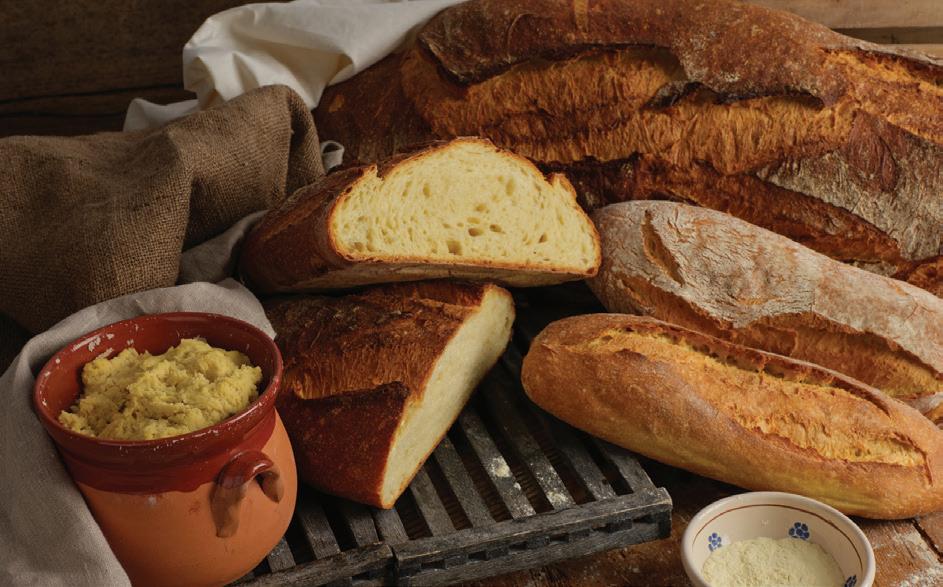
the world’s other food manufacturing sector, confirming its commitment to a more ethical and sustainable future.
“This result validates our company’s sustained efforts over many years towards tangible sustainability improvements,” said Lucia Forte, CEO of Oropan S.p.A. “We are driven by our responsibility to leave a better planet for future generations, and we are committed to achieving emission neutrality by 2029, in line with the UN Agenda 2030.”
Company Uniqueness
Founded by Vito Forte, one of Altamura’s most renowned bakers since 1956, Oropan S.p.A. embodies the rich tradition of Italian bread-making. As a child, Vito Forte collected hand-kneaded dough from local housewives to take to the community oven for baking. This early experience laid the foundation for his mastery of traditional bread-making techniques, utilizing durum wheat semolina, mother yeast (lievito madre), and a slow natural raising process. The result is a unique range of breads and bakery products characterized by their distinctive crispy crust and golden-yellow texture, naturally containing protein and antioxidants.

Product Range and Quality Certifications
Today, Oropan S.p.A. stands as one of Italy’s most respected bakery companies. The firm successfully merges traditional production methods with innovative technologies to create a diverse range of products, including bread, focaccia, friselle, and bread rolls. With significant production capabilities, Oropan S.p.A. is the ideal partner for both national and international retailers. Oropan’s products are distributed daily across 2,400 retail stores in Italy and in 25 international markets (both EU and non-EU). A hallmark of the company is its robust quality management system, certified by esteemed organizations such as BRCGS (AA+), IFS (Higher Level), and ISO 9001:2015.
Your Sustainable Bread Partner
The company’s steadfast commitment to social and environmental responsibility is evident in its numerous voluntary certifications, including SA 8000 (socially acceptable practices in the workplace), ISO 14001:2015 (Environmental Management System), ISO 45001:2018 (Occupational Health and Safety Management Systems), ISO 14046:2014 (Water Footprint), and 14064-1:2019 (Carbon Footprint).
Looking ahead, Oropan S.p.A. will showcase its offerings at PLMA in Amsterdam and ANUGA in Cologne in 2025.
gourmetbreads@oropan.it

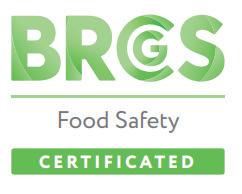

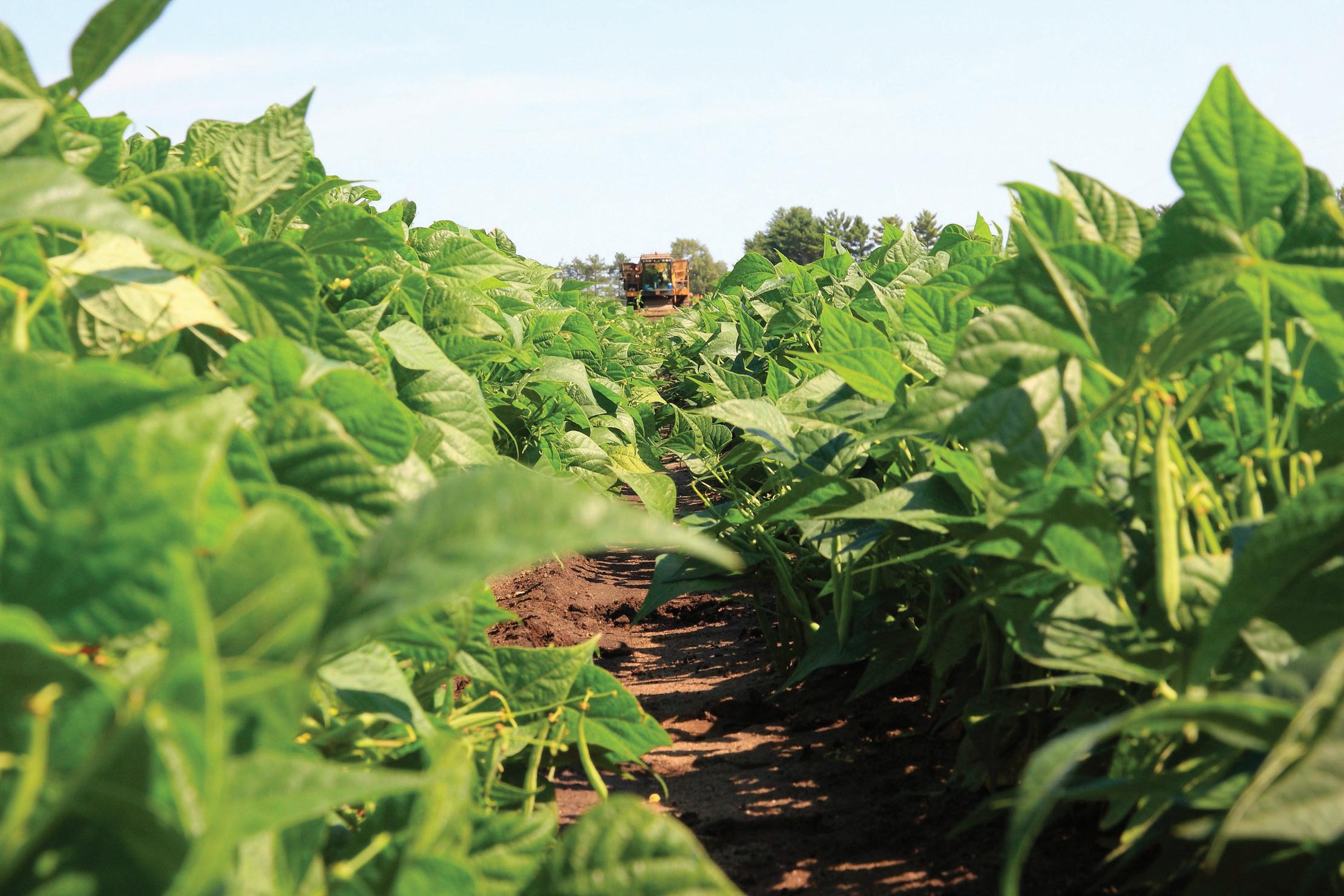

The Deep-Fried (R)evolution
Valsa Group, a leading manufacturer of frozen, chilled, and ambient pizza, pinsa, focaccia, and snacks, identifies its primary goal as promoting the true Italian food lifestyle across the globe. The headquarters is located in Valsamoggia, in the very heart of Italy. This is where the history of the Group began; nevertheless, our roots extend from North to South, through our 10 plants, following a purely Italian entrepreneurial path.
Our daily commitment can be summed up as follows: CULTURE. EXCELLENCE. INNOVATION.
Valsa Group launches a new range of deep-fried pizzas and snacks. Introducing the surprising Pan Frit, a soft and melty delight in every bite: the most delightful Italian fried dough. Light and fragrant, it offers a flavorful alternative to bread itself, making it the perfect match for both sweet and savory options. Stuff it, dip it, share it: Pan Frit is the irresistible treat you won’t want to give up.

The amazing mini panzerotti are delightful treats from the heart of Apulia, blending the authenticity of Mediterranean cuisine with modern convenience. A flavorful filling in numerous variations is wrapped in thin, golden dough, representing one of the most traditional Italian recipes.
And…what if pizza could be taken to the next level? Deep-fried pizza, a voyage through uncharted local Italian traditions: a mouthful of tasty, delicious nuances; it is the perfect product to be shared or enjoyed alone. The most flavorful dough you’ve ever tasted in a pizza.


A deep-fried (R)evolution, showcasing the exceptional quality found exclusively within Valsa Group.
The Group’s strategy strength is the combination of traditional manufacturing processes and a greater focus on consumer convenience while maintaining the highest quality standards. In the contemporary market, convenience supported by premium quality is essential to creating value in the supply chain.
Valsa Group is a reputable and recognized business partner in 50 countries worldwide. This success is due to its focus on sustainability, production capacity, organizational integration, and innovative convenience, alongside a strong commitment to transparency, waste reduction, and the use of green energy.
Through the brands Valpizza, La Pizza+1, Forno Ludovico, Megic Pizza, Ghiottelli, Il Borgo, and Tuscanya Bakery, Valsa Group is a unique, largescale, and highly qualified partner able to supply a wide range of items in each category, from frozen to deli. info@valsagroup.it
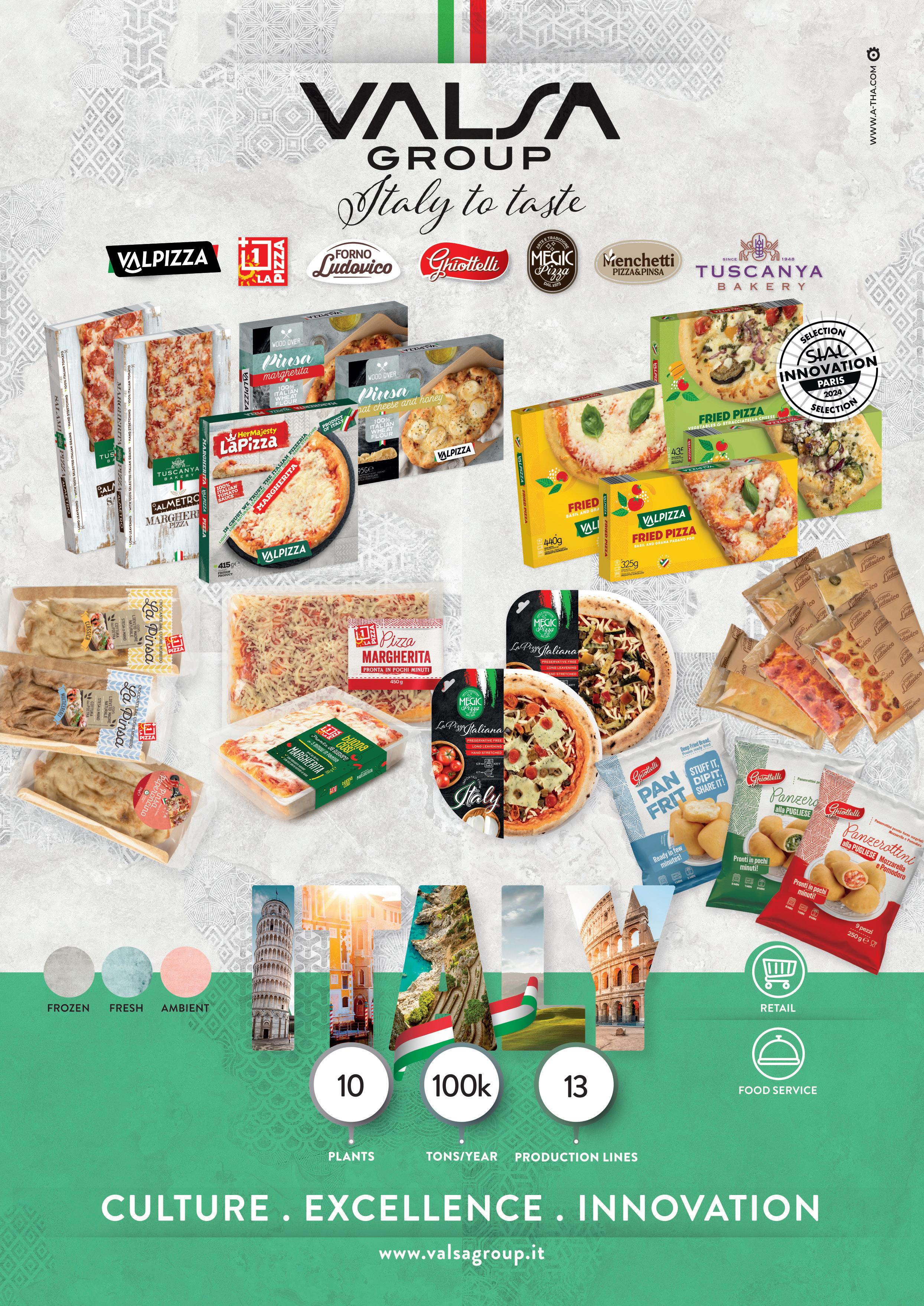
The V-Label: The International Vegetarian and Vegan Brand Par Excellence

The V-Label brand is an internationally recognized symbol that identifies vegetarian, vegan, and raw vegan products and services par excellence.
Created in 1976 as an institutional symbol of the Italian Vegetarian Association, it is now the most recognized synonym for vegetarian and vegan products among consumers worldwide. Its clear, unique image is intuitively linked to vegetarianism and veganism in every part of the globe, effectively transcending any language barriers.
Officially presented internationally at the first European Vegetarian Congress held in Italy in 1985, it quickly spread first to Europe, and shortly thereafter to the rest of the world.

The V-Label brand is now registered in over 70 countries worldwide and can be found globally: it clearly and safely identifies products and services of various types, from food to textiles and from footwear to cosmetics, as compatible with the vegetarian and vegan lifestyle.
But being international doesn’t just mean being widespread, it requires much more than this. It involves the ability to effectively transmit and receive often technical content without making mistakes. This is made possible by the close relationships we have cultivated with our customers. In most cases, the V-Label brand is distributed by local managers who, being

familiar with the local language and culture, can better convey information to producers and consumers. This local approach also enables us to handle technical material in documents without risking translation errors or misunderstandings.
Despite the widespread availability of the brand in extremely different areas, both in terms of culture and traditions, the V-Label brand has maintained the same verification criteria and standards in every place. This uniformity aims to offer seriousness and quality to consumers who rely on the V-Label brand when choosing which products to buy.
The balance between the local approach and adaptation and the standardization of criteria and processes so that they remain unchanged is what makes the V-Label brand truly international, even more than its widespread coverage.
Are you looking for expertise in vegetarian and vegan expert with world-class experience? Contact us by writing to: segreteria@vlabel.it
www.vlabel.org
Innovating Cleanliness: Whitecat’s 76-Year Journey Safeguarding Healthy Families
Chapter 1: A cat was born in 1948
In 1948, in Yongtai Village, Shanghai county, China, an entrepreneur started a small, private, manufacturing company with a goal to provide laundry soap to local residents in postwar China. This was the start of what would be later known as “Shanghai Bái Māo” by locals, or Shanghai Whitecat, he embarked on a journey of necessity, groundbreaking innovation, and a steadfast commitment to safeguarding the healthy lives of families. Motivated by necessity after the end of World War II, Shanghai Whitecat worked diligently to provide much needed laundry cleaning products that surpassed traditional soap, made from soap bean and “Yizi” (made from pig pancreas and plant ash), for more effective cleanliness and well-being to local families.
Chapter 2: Pioneering Innovation since 1959
In 1959, Shanghai Whitecat achieved its first of many milestones by introducing the first domestically produced package of synthetic laundry detergent powder “Gong nong” in mainland China. Since then, Whitecat has achieved many milestones.
• 1963: 1st autonomous washing powder paper bag packaging machine
• 1981: 1st domestically developed and produced pack of Super Concentrated Laundry Powder
• 1987: Whitecat brand and our Jaimei brand Laundry Powder awarded the “Shanghai Famous Brand” certificate
• 1995: Whitecat Laundry Powder was awarded the “Golden Bridge Award” for National Best selling Domestic Product for 4 consecutive years.
• 2004: Whitecat liquid detergent was chosen as “China Famous Brand”
• 2018: Whitecat Lemon Black Tea Dishwashing liquid won the “2017 China Biggest Award of Quality Consumer – Quality Gold Award”
• 2018: Shanghai Hutchison Whitecat Co., Ltd., was awarded “China’s Top 100 Daily Chemicals”
Chapter 3: Longevity Through Innovation
As Shanghai Whitecat celebrates its longevity, our narrative transcends labels and brands. It’s a story of enduring innovation, necessity, and lives touched. Whitecat is humbled by the trust of millions of families who rely on us daily to safeguard their healthy lives.
Trust built over many decades of hard-work and investment in research and development.
• More than 100 national patents
• Millions of dollars spent every year in R&D
• Over 50 research and development personnel (> 50% with Master’s or doctoral degrees)
Our technology center is the only national standard laboratory in the light chemicals industry.
Investments in latest scientific equipment such as gas chromatography/mass spectrometry

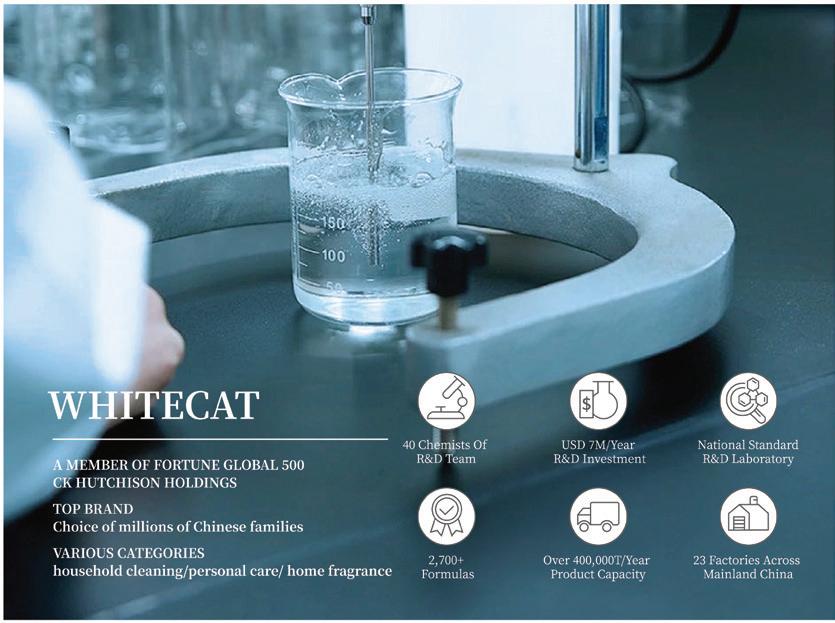
(GC/MS), Fourier infrared spectrometer and other advanced international standard analysis and testing instruments ensure we keep our commitment to delivering highquality, cost-effective Home Care and Personal Care products to safeguard the healthy lives of families into a better tomorrow.
Chapter 4: Sustainability for a Better Tomorrow
Whitecat’s dynamic culture of innovation, born out of necessity in 1948, is now shifting to Sustainability, safeguarding healthy families better for all, including our planet.
We are very excited to launch our sustainable, nature inspired, line of products for our private label naturebased, sustainable Home Care and Personal Care products that your customers will simply Love!
• Concentrated cleaning pods/ sheets/tablets
• Lactic acid-based cleaning products
• Soda-based cleaning products And more innovative products to come.
Join us in this exhilarating journey towards a greener, more sustainable tomorrow with Whitecat!
www.whitecatusa.com




DEK Deutsche Extrakt Kaffee www.dek.de/en

www.certifiedorigins.com

www.gruppoladoria.it/en

ITA (Italian Trade Agency) plmaams25.eventidigitali.ice.it


www.chiaverinifirenze.it




www.oropaninternational.com


THE POWER OF THE PACKAGE
Staying Relevant in a Changing Landscape
In today’s fast-paced retail world, where competition is fierce and shelf space is precious, one truth stands strong: the power of packaging is real. Private brand is no longer the underdog. It’s the disruptor, the category leader, the quiet force reshaping consumer behavior. Yet staying relevant in private brand becomes more complex every year. At MBD we stay on top of the trends so you don’t have to! We are eager to share the proof that package design sells, tips and tricks on how to stay on top of the market along with some tidbits about what’s upcoming with rules and regulations on pack.
Now is the time for Growth and Opportunity
The statistics concur, consumers are no longer loyal to their brands. A brand is a brand whether it’s exclusive to a retailer or not. Younger generations simply do not care, nor do they remember the days when store brands were of lesser quality. Now they can have it all – quality, value, and convenience. Retails brands are winning across the board accounting for 24% of total CPG sales. Retailers have all the power and suppliers’ products are making a difference in the marketplace. Growth is at your fingertips and your package design must stand out to be noticed.


PLMA 2024 Survey:
• 2024 PB sales in US reached $271 BILLION
• Gen Z loves store brands!
• Some say package design is a driver
FMI 2024 Survey:
• 46% say they will purchase “much more” PB this year (37% last yr)
• Drivers include “appealing packaging”
• 52% of industry say packaging is one of the top areas of importance for driving growth
• 33% of industry say “enhancing pkg design” is best way to drive growth in NPD
Let’s take a look at how powerful a package can be in the real world. CVS beauty products saw a 20% lift in product sales by telling a heartfelt brand story.



During the six months following the redesign, sales of CVS Beauty products increased by 20% compared to the same period during the prior year.
Designalytics – December 2, 2024 www.designalytics.com/insights/awards-cvs
Albertsons’ Signature Select pizza redesign boosted communication and visual appeal


Boosted consumer purchase preference compared with the previous design.
Designalytics – June 5, 2024
Designalytics – June 5, 2024 www.designalytics.com/insights/9-private-labelredesigns-thatll-make-you-look-twice

Wakefern Bowl & Basket pasta optimized updated with clearer product descriptions and effective use of color and serving suggestion imagery


Boosted consumer purchase preference compared with the previous design.
Designalytics – June 5, 2024 https://www.designalytics.com/insights/9-privatelabel-redesigns-thatll-make-you-look-twice
Sprouts Farmers Market frozen waffles category supported shopability with improved communication hierarchy and unexpected color cues to stand out.


Boosted consumer purchase preference compared with the previous design.
Designalytics – June 5, 2024 www.designalytics.com/insights/9-private-label-redesignsthatll-make-you-look-twice
There’s a real lot to say these days…
Communication hierarchy is so important for shopability. How often do consumers come home with the wrong variation of the product? Our job is to help the customer understand, in 3-5 seconds, the key features and differentiation of the product. It’s a balancing act to maintain your brands voice with great design while aligning with category norms and saying all you need to say in a very small space.
This is increasingly more difficult as we add more and more certifications, claims and contextual communication on your package.
That’s where trained professionals come in. Work with a team who specialize in maintaining a great looking package while fitting everything in.



Understanding ever changing regulations
Now, more than ever, we are seeing changes and new requirements on what you can and can’t say. When you make a claim there are so many rules about where it can be placed, backed up with disclaimers, nutrition facts inclusions, etc. Consumers want more information and transparency – and they are getting it!
• Pay close attention to the everchanging regulatory landscape
• Know what changes may be upcoming to get ahead
• Plan your packaging updates and rebrands accordingly
• Be aware of trends, ex: high protein, low sodium, low sugar, plant based, etc.
MARIA DUBUC PRESIDENT MBD

Upcoming changes to be aware of (top 3 affecting packaging)
1) FDA Front of pack proposed for all foods on top 3rd of pkgs (if room show just the top box image only)
2) H2R updated v2 graphics available now provides more clarity
3) UPC will be sunset and replaced by multi-functioning QR code in 2027 (10 yr transition period)
Reach out to MBD for a full listing of federal or state by state upcoming regulatory updates.
What’s hot on the horizon
• Ban of dyes and chemicals
• Sodium reduction
• Healthy claim updates
• Changes to allergen statements
• Food date labeling
• Extended producer responsibility (EPR)
• State by state rules
In summary, don’t be fooled by how simple it looks once a package is on shelf. There’s so much more that goes into the strategy and design of your brand. It’s more important than ever to take the time and effort to get the best design for each and every SKU. Pay attention to the details, make sure you are communicating properly for the best sales opportunity.
The power is in your hands!
• Consumers want it, you’ve got it!
• Uncover your opportunities
• Innovate and optimize
• Relook at your brand design
• Consider what’s in store for the future
• Consumers want to buy our products
Let’s harness the true power of packaging and win!
PRIVATE LABELS 2.0: HOW RETAILERS ARE WINNING THE INNOVATION GAME
Once seen as budget alternatives, private labels are now powerful tools in the retailer’s strategic arsenal—driving innovation, loyalty, and profit. In today’s fastpaced retail environment, they are reshaping the landscape by offering high-quality, innovative, and purpose-driven alternatives to national brands. Retailers are no longer just selling products— they are building brands, telling stories, and setting trends.
Retailers in the Driver’s Seat
Unlike national brands that operate within limited categories, retailers control their entire product ecosystem—ingredients, packaging, pricing, and communication. This end-to-end control enables fast, responsive innovation. Whether it’s removing additives, reducing sugar and salt, or switching to recyclable materials, private labels are often first to adapt to health and sustainability trends.
Retailers can also respond rapidly to market shifts, testing new products directly in-store with minimal risk. A failed private label launch exits quietly; a hit can redefine an entire category.
Innovation at Scale

Private label is no longer a follower. According to Nielsen, 58% of consumers believe private labels are as innovative as national brands—and 26% believe they’re more innovative. Whether it’s limited-edition flavours, seasonal ranges, or plant-based alternatives, private label leads in tapping into emerging trends.
Waitrose’s Japanese-themed ‘Japan Menyu’ line is a prime example. Using AI tools to scan consumer behavior and social media trends, the UK retailer identified a surge in interest in Japanese cuisine—and launched a 26-product range in record time. Migros in Switzerland took it even further, using AI (including ChatGPT and Midjourney) to develop a new vegan drink from scratch— ingredient selection, branding, and packaging included.
AI: The Game-Changer
AI is transforming private label development by making innovation faster, cheaper, and more predictive. It enables retailers to automate market research, generate packaging designs, and personalise recommendations.
Platforms like Tastewise or Black Swan Data mine social media, recipe searches, and loyalty card data to predict what consumers will want next.
Retailers like Tesco are already using AI tools to create location-specific assortments for their convenience stores. Others are using AI to test seasonal concepts that can become permanent lines, like Aldi’s Halloween-themed naan bread— essentially the same product with a spooky twist, sold at a 40% premium.
The Influence of Social Media
Gen Z and Millennials are redefining how private labels are discovered and trusted. Social media gives retailers direct access to consumers—and vice versa. Influencers play a crucial role, not just in visibility, but in credibility. Albert Heijn’s launch of AH Terra, a plant-based range, relied heavily on influencer partnerships to ease consumers into the shift.
Consumers also use social media to compare private labels with national brands, post recipes, and give feedback—making it a powerful loop for both marketing and product improvement.

Premium, Free-From, and Ethical Are the New Norm
Retailers are increasingly investing in value-added private labels—organic, vegan, gluten-free, and premium-tier lines that command higher prices and build loyalty. These products often carry ethical or sustainability credentials and are presented in highend packaging with a clear visual identity.
Across Europe, ranges like Tesco Finest, Eroski SeleQtia, and SPAR Premium are designed to rival national brands—and sometimes even restaurants. In Italy, regional labels like CONAD’s Sapori & Dintorni or Unes’ Il Viaggiator Goloso blend local sourcing, PDO certifications, and storytelling into compelling brand experiences.
The objective of value-added private labels is to offer products with less price elasticity, generate margin, and give distinctiveness to the store-banner brand.
— Sales & Marketing Director, IPLC Research 2018.
According to IPLC research, valueadded private labels can cost up to 244% more than standard ones—yet consumers still perceive them as delivering better value for money.
The Rise of Venture Brands
To bridge price gaps or bypass brand dependency, some retailers have created “venture brands”— private labels that don’t carry the retailer’s name. These are particularly effective in emotionally sensitive categories like coffee, beer, or personal care.
EDEKA’s creation of “Papa Joe’s” ketchup during a dispute with Heinz, and Plus’ introduction of “Sense” to compete with Becel, demonstrate how venture brands can tactically fill gaps while preserving margin and brand independence.
Seasonal & Export Potential
Private labels now play a central role in seasonal campaigns. Whether it’s Christmas desserts or Valentine’s treats, these limitededition products drive footfall and margin. In some cases, successful seasonal lines become permanent.
Exporting private labels is also gaining traction. Waitrose exports over 1,000 private label products to 40+ countries. Albert Heijn stocks frozen goods from French retailer Picard as exclusive lines— offering differentiation without the overhead of product development.
A Strategic Imperative
The evolution of private labels from copycats to trailblazers reflects a deeper shift in retail strategy. By owning the brand, the product, and the consumer relationship, retailers can innovate faster, price smarter, and build loyalty deeper than ever before.
In an era where differentiation is everything, private label isn’t just a tool—it’s a competitive advantage.


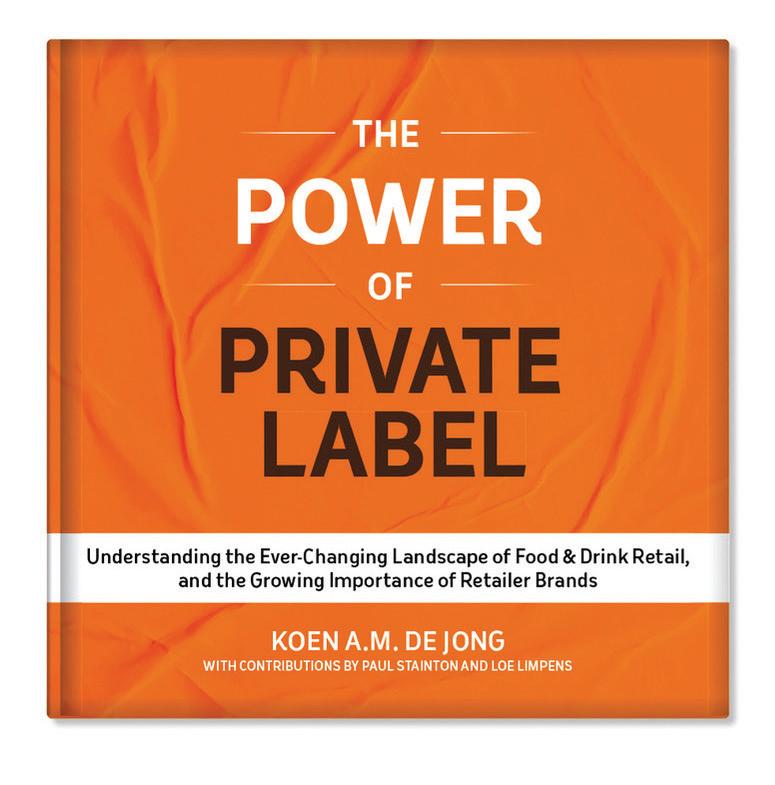
Koen De Jong
Koen has extensive management experience in the private label manufacturing industry in Germany, France, the United Kingdom and the Netherlands. He has been involved in numerous M&A transactions in the Benelux. His private label strategy and business planning involvement includes company analysis and benchmarking, board consulting and the participation in supervisory boards. He speaks fluent English, German, French and Dutch (mother tongue).
Second of a series taken from the book, The Power of Private Label
THE WEIGHT OF CHANGE
How GLP-1 Medications
Are Reshaping Consumer Behavior And The Private Label Market
A silent revolution is happening in grocery aisles and food courts around the world. The culprit? Not a flashy new diet, a viral superfood, or a health influencer’s latest obsession. Instead, it’s a class of medications that most people had never heard of just a few years ago: GLP1 receptor agonists, originally designed for diabetes but now increasingly prescribed for weight management.
These drugs, including names like Ozempic, Wegovy, and Mounjaro, are altering how people interact with food, and that’s already sending little shockwaves through the entire food and beverage industry. Consumers are eating less, craving differently, and making purchasing decisions in ways that could shake the foundations of food retail. For private label producers this shift presents both a challenge and an opportunity, as millions of people are overweight or obese, and more and more effective medicines are on the rise. At this moment almost 500 new medicines are in development. Okay, not all will finally enter the market, but the effectiveness of the new medicines is not to stop.

A New Relationship With Food
Imagine stepping into a supermarket with a different mindset. The hunger pangs that used to drive impulse snack purchases? Muted. The craving for sugary indulgences? Subdued. This is the lived experience of many GLP-1 users, who report significantly reduced appetites and a dampened emotional connection to food.
This change in consumer behavior is already showing in sales data. Fast food chains are reporting declines in portion sizes and frequency of visits. Grocery baskets are seeing fewer high-calorie impulse buys and more protein-rich, nutrient-dense selections. For food manufacturers - particularly those that rely on impulse-driven sales - this is a pressing challenge.
According to a recent KPMG report, the rise of GLP-1 medications is expected to have a long-term impact on food consumption patterns, influencing everything from product development to marketing strategies in the retail sector. The report highlights the growing need for brands to adapt to changing consumer behaviors by offering smaller portions, higher nutritional density, and health-conscious formulations.



The Private Label Perspective
Also for private label producers now face a shifting landscape. Consumers on GLP-1 medications may be buying less, but they are not necessarily spending less. In fact, they are seeking quality over quantity, focusing on nutritional value rather than volume. This presents an opportunity for private labels to pivot their strategies toward products that align with this new behavior.
How Private Label Brands Can Adapt?
1. Reformulating for satiety and nutrition
If GLP-1 users eat less, every bite matters more. Private label brands must prioritize nutrient-dense formulations that appeal to this growing consumer base. Protein-rich meals, fiber-packed snacks, and balanced frozen options can become strong categories for growth.
2. Smaller portions, higher quality
The era of supersized meals may be waning. Instead, private labels can innovate with smaller, premiumformat offerings – think of gourmet snack packs, portion-controlled ready meals, and high-protein single-serve yogurts.
3. Health-centric marketing
Packaging and branding will need to shift towards highlighting nutritional benefits rather than simply price advantages. Claims such as “high in protein,” “rich in fiber,” “gut-health friendly,” and “low glycemic impact” could resonate strongly with GLP-1 consumers.
4. Functional ingredients and personalized nutrition
The next frontier for private label brands could be functional foods— those with added health benefits. Probiotic-enhanced snacks, vitaminenriched beverages, and proteinpacked meal replacements can cater to consumers who are consciously optimizing their nutrition.


5. Diversifying retail strategies
If grocery store trips become less frequent due to reduced food consumption, private label brands may need to rethink how they engage consumers. Subscription models, direct-to-consumer channels, and personalized recommendation algorithms could help sustain brand loyalty in a market where food consumption is decreasing overall. With GLP1 in mind.
The Road Ahead
The rise of GLP-1 medications is not just another diet trend, it’s a medical revolution that’s redefining food consumption at scale. Private label producers who understand this shift and act swiftly will be best positioned to thrive in the new food economy. Those who cling to traditional volume-driven models may find themselves struggling to keep pace. For now, the smartest move for private labels is clear: embrace the change, innovate with intent, and recognize that the weight of change - just like the weight on the scale for millions of consumers - is moving in a new direction.
Hans Kraak
Hans Kraak is educated in biology and journalism and wrote three books about nutrition and health. He worked for the Dutch ministry of Agriculture, Nature and Food quality and the Netherlands Nutrition Centre. As editor in chief he publishes in the Dutch Magazine for Nutrition and Dietetics, as a food and wine writer he published in Meininger’s Wine Business International and reports for PLMA Live EU and PLMA USA.

AN OPEN LETTER TO PRIVATE BRAND MANUFACTURERS
From my vantage point as the former Vice President of Private Brands at C&S Wholesale Grocers and de facto CMO at Save A Lot, I’ve seen the full spectrum of partnerships—some that drove measurable business growth, and others that never moved beyond being transactional. What I know to be true is this: the partnerships that delivered real results were never one-sided. They required full commitment from both parties—especially at the leadership level.
Mutual Commitment and Market Understanding
A valuable partnership is not built on product and price alone. That’s baseline. The most effective manufacturers know our business well—what we sell, where we win, where we’re exposed—and they help us fill the gaps. They show up with insights we haven’t asked for yet: new tastes, trends, international flavor profiles, and competitive whitespace. They’re not guessing. They’ve done their homework, and they’ve come with ideas that have data, relevance, and purpose behind them.
JILL DEARING FOUNDER & CEO DEARING & COMPANY


Proactive Innovation and Operational Accountability
Innovation doesn’t always mean the next big thing. Often, it’s a thoughtful SKU rotation. A more efficient pack size. A product line that keeps us appropriately positioned—not just trendy. The strongest partners use their own performance metrics to guide meaningful conversations. They don’t wait for a quarterly review to say something’s not selling. They come forward with clarity—what’s working, what’s not, and what they’re doing about it. They bring solutions: replacement SKUs, margin improvements, service-level upgrades. That level of initiative and accountability is what keeps a program strong.
Executive Engagement and Shared Decision-Making
This kind of work cannot live only at the category and sales manager level. It requires leadership engagement— VPs, SVPs, and C-suite executives on both sides—aligned on expectations, responsive to the realities of the business, and committed to ongoing dialogue. The best manufacturers know this, and they’re intentional about showing up. Not just for the sale—but for the relationship.
Looking Ahead
As you walk the halls of PLMA, “World of Private Label” consider this your moment to reset how you approach your partnerships. Start with depth. Bring insight. Commit to more than your cost list. The most successful programs I’ve led were driven by manufacturers who understood this from day one—and proved it every step of the way.
This is the first of a three-part series. In the next article, we’ll talk about what it looks like to lead together through crisis—because the strongest partnerships aren’t tested when things are easy. They’re proven when things get hard.
Jill Dearing
Jill Dearing, founder & CEO of Dearing & Company, leverages her extensive experience in the grocery, food, and private brand industries to drive innovative solutions and strategic transformations. She can be reached via email at jdearing@dearingco.com or visit www.dearingco.com.







PRIVATE LABEL POWER OF THE POWER OF











Understanding the Ever-Changing Landscape of Food & Drink Retail, and the Growing Importance of Retailer Brands
KOEN A.M. DE JONG
WITH CONTRIBUTIONS BY PAUL STAINTON AND LOE LIMPENS



Private label is an increasingly important part of a retailer’s ‘jigsaw’. It is key to offering a compelling and profitable range of goods to their customers.
THE POWER OF PRIVATE LABEL delves into every element of the subject, from conception through to delivery – no stone is left unturned in helping the reader fully understand the growing complexities of the private label industry.
Yet this book covers much more than just private label – we explore how supermarkets and discounters operate their businesses, the role that brands play alongside private label, and the key levers used by all retailers to build customer loyalty, the key to running a sustainable and profitable business.
Two chapters are dedicated to discount retailing, providing deep insight into the strategies deployed by the main operators and those used by the supermarkets to fight back against discounter growth.
The buyer-supplier relationship is explored in detail, with the ever-changing pressures on both parties leading to changed dynamics in the ‘balance of power’.
Along with a full review of how the manufacturing landscape is shaping up, and extensive insight into how a private label manufacturer can stand out from the crowd, THE POWER OF PRIVATE LABEL is an invaluable tool for all players in the fastmoving consumer goods industry.
Full color, hard cover, 280 pages, more than 200 photos and charts.
Price €125 excluding handling and shipping costs.

This book is only available via the Internet: www.iplc-europe.com
JAPANESE PRIVATE LABEL SECTOR SHOWS POSITIVE DYNAMICS THIS YEAR
The Japanese private label sector shows positive dynamics this year, thanks to the ever-expanding local range and promising prospects for further growth. While the Japanese economy continues to face serious stagnation due to the weakening yen and the decline in purchasing power of local consumers, the demand for private labels among residents is steadily increasing. Whereas in the past, most of this demand came from price-sensitive consumers, the situation has changed in recent years.
In general, the history of private label in Japan officially began in 1960 with the launch of the first food private label product in the country – the canned “Daiei Mikan” mandarin oranges by the local Daiei supermarket chain. From around 1960, major department stores , supermarkets , and the Japanese Consumers’ Co-operative Union began producing private brand products on a large scale.
At the initial stage, they are mainly positioned as cheaper alternatives to national brands – the products of well-known Japanese manufacturers, which were actively
promoted through TV, media, and other resources. Originally, private label products were sold in Japan at prices substantially lower than those of national brands, generally reflecting lower quality.
The situation, however, changed after the Great East Japan Earthquake in 2011, when local citizens began making massive purchases of food and other products in domestic supermarkets due to fears of further tsunamis and potential shortages. During that time, many consumers first realized that the quality of private label products was not much different from that of national brand products.
Professor Hiroshi Nakamura of Chuo University Graduate School, who is an expert in retail marketing strategies, said the Great East Japan Earthquake provided a major impetus for the growth of the Japanese private label sector.
Hiroshi Nakamura comments:
Japanese consumers have a very strong preference for branded products, so I think many people hadn’t even tried buying private brand products until then. But when they reluctantly tried buying private brand products, they realized they weren’t bad. The value that private brand products originally had became clear.”



In recent years, the range of private label products in Japan has significantly expanded with the emergence of high-quality private label goods. According to a recent report by the Japanese Nikkei business paper, last year the number of private labels in the domestic market grew considerably as more local supermarket chains have focused on private brands. The expansion of the range is also continuing this year.
According to the 2024 Supermarket White Paper (X3), a study dedicated to the Japanese supermarket sector, condiments and frozen foods are especially popular among local supermarket chains these days. Due to regular price hikes and maintaining high inflation rates, more and more local consumers are turning to relatively low-priced private brands.

As food prices remain high in Japan these days due to rising raw material costs, the demand for private label products stays robust. In fact, the share of private label products in supermarket food sales reached an all-time high of about 17% in October 2023 and remains nearly at the same level. In response to this increased demand, leading local retailers are working on launching new private label brands. Furthermore, amid the everrising food prices, representatives of prominent Japanese retail chains, such as Aeon and Seven & i Holdings (HD), have recently announced price reductions for their own product ranges. This includes reductions for iconic private label lines like Seven-Eleven's' Seven Premium" and Aeon's' Top Valu, ' which are among the pioneers of private label brands in Japan, as part of their efforts to attract additional customers

EUGENE GERDEN FREELANCE JOURNALIST

Currently both Aeon and Seven & i Holdings remain major players in the Japanese private label market. As for Aeon, in recent years it has revamped most of its food private label range, while Seven & i Holdings has doubled its low-priced private label lineup. Aeon sells 2,500 of its 5,000 food products under its private label brand "Top Value," excluding fresh produce.
According to a survey compiled by the Japanese National Supermarket Association, the percentage of supermarkets handling private brands will be closer to 82.5% in 2025. Moreover, in addition to lowcost private brands, value-added private brands such as organic foods such as Aeon's "Green Eye" have also appeared, widening the range of products. Local analysts believe the share of premium private labels will only continue to grow in the Japanese market during the period of 2025-2026.
Eugene Gerden is a freelance writer who writes on a wide range of international topics, from commerce to chemistry and from wine to aviation. He has contributed to many publications, including Decanter, International Aviation News, Chemistry World and The Journal of Commerce. For Decanter, he has covered several stories on wine markets and production in Russia, Georgia and Bulgaria. gerden.eug@gmail.com
THE BEAUTY INDUSTRY’S STRATEGIC PLATFORM FOR PRIVATE LABEL INNOVATION
16-17 JULY 2025
LAS VEGAS, NV
Cosmoprof North America (CPNA) will return to Las Vegas for its 22nd edition from July 15–17, 2025, at the Mandalay Bay Convention Center. As the leading B2B beauty trade show in the Americas, CPNA offers a comprehensive platform for brands, retailers, and manufacturers across the beauty and personal care sectors—including those focused on private label development and innovation.
Building on the momentum of its 2024 edition, which welcomed over 26,000 attendee visits from 113 countries and more than 1,100 exhibitors, the 2025 show is expanding its footprint with a new hall and a larger Cosmopack section. Cosmopack, which represents the entire beauty supply chain, will spotlight innovations in contract manufacturing, raw materials, packaging, and sustainable solutions—making it a key destination for private label retailers looking to source next-generation product capabilities.
Cosmoprof North America is introducing a new Korean Beauty area reflecting continued consumer interest in Korean beauty innovations, and offering retailers and product developers early access to emerging trends in skincare, color cosmetics, and haircare.

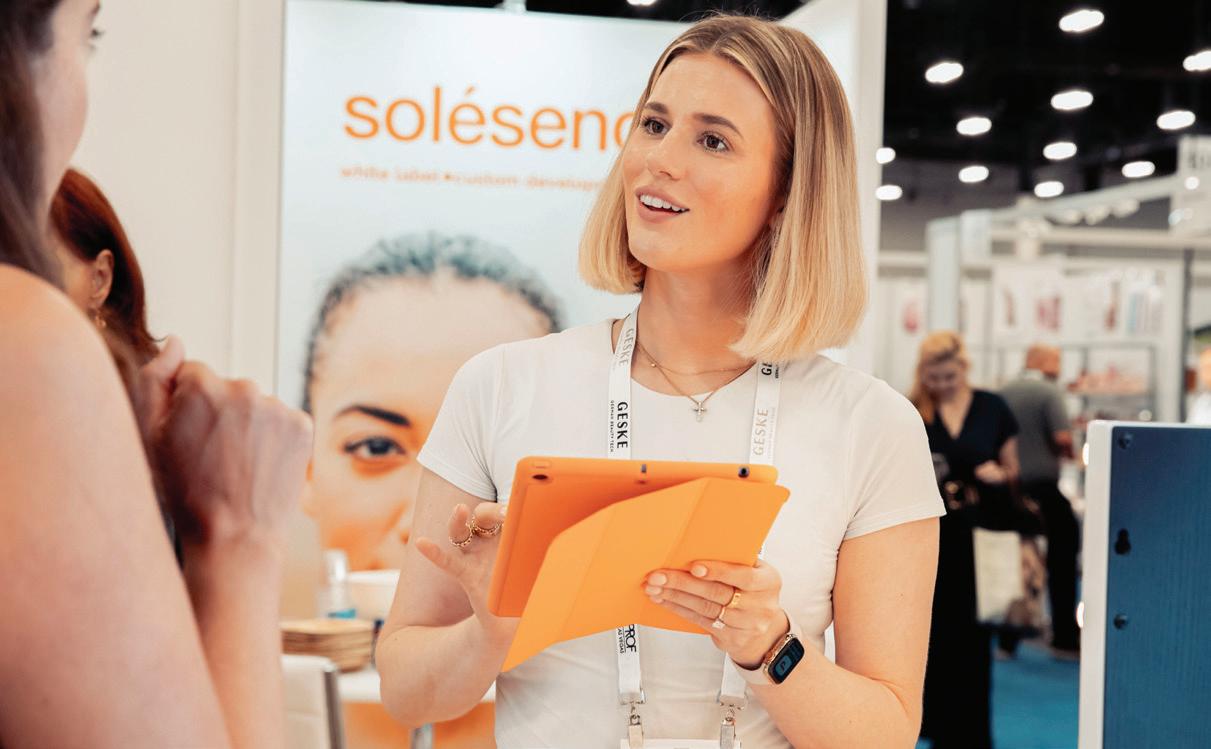
Additional specialty areas include Discover Beauty, Discover BlackOwned Beauty, and The Beauty Vanities that provide a curated look at indie and inclusive brands, offering retailers and buyers a more diverse portfolio to explore. These areas are designed to reflect the growing consumer demand for values-based shopping, giving private label developers insight into the ingredients, packaging, and storytelling shaping today’s beauty market.
Educational programming will include the return of CosmoTalks, Entrepreneur Academy, and Cosmopack Education—featuring content relevant to formulation, packaging design, sustainability, and retail strategy. For brands and retailers alike, these sessions offer actionable insights that support business development and differentiation in a competitive global market.
CPNA’s Buyer Program will facilitate targeted meetings between exhibitors and key retailers, distributors, and brand decision-makers, fostering meaningful partnerships. Meanwhile, the CosmoTrends report, developed by global trend forecasting agency BEAUTYSTREAMS, will offer an exclusive look at the most innovative product launches and trends seen on the show floor.
For private label and retail professionals, Cosmoprof North America Las Vegas 2025 offers a unique opportunity to stay ahead of industry trends, source innovation, and build strategic partnerships.
cosmoprofnorthamerica.com







• THE LEADING B2B BEAUTY EVENT IN THE AMERICAS, DEDICATED TO ALL SECTORS OF THE INDUSTRY













• LAS VEGAS MANDALAY BAY CONVENTION CENTER

• JULY 15 – 17, 2025




• COSMOPROFNORTHAMERICA.COM
• REGISTER NOW AND SAVE UP TO 30% WITH EARLY BIRD SAVINGS!















THE ONLY B2B BEAUTY EVENT FOR THE ENTIRE SUPPLY CHAIN IN THE AMERICAS: INGREDIENTS & RAW MATERIALS, PRIVATE LABEL & CONTRACT MANUFACTURING, MACHINERY, PACKAGING
Organizer – USA Beauty LLC
A new world for beauty Bologna, Hong Kong, Las Vegas, Mumbai, Bangkok, Miami
ANUGA PRESENTS THE MOST IMPORTANT TRENDS AND FOCAL THEMES OF 2025
4-8 OCTOBER 2025 COLOGNE
Anuga, the largest international trading platform in the global F&B industry, collaborates with its knowledge partner, Innova Market Insights, to present the key trends and focal themes for 2025. These developments reflect the industry's growing innovative capacity and will play a crucial role at Anuga 2025. Personalized food, sustainability, alternative protein sources, and the increasing influence of private labels are particularly highlighted.
Personalized Food:
Catering to People's Preferences. The demand for individualized food is increasing. Personalized food allows consumers to choose food and beverages that align with their specific preferences and eating habits. Aspects such as a balanced diet, nutrient-based intake, and functional foods are gaining attention. According to the Innova Trends Survey 2025, over one-third of consumers utilize enriched food and beverages for targeted nutrient intake. The market for products that help regulate weight is experiencing particularly strong growth, with an annual growth rate (CAGR) of 8% from 2022 to 2024. The USA, India, and the United Kingdom are leading this trend, while Germany is seeing the highest growth within Europe.

Sustainability:
Environmental awareness characterizes the market. The emphasis increasingly lies on sustainable products; especially, plant-based proteins like fava beans are gaining significance. Germany, the United Kingdom, and Finland are leading in this area, while Switzerland is seeing the highest growth in Europe at +108%. At the same time, the demand for alternatives to climate-sensitive raw materials, such as cocoa, coffee, and orange juice, is rising. These innovative solutions help reduce the burden on the environment and meet consumers' growing demands for sustainability. Already, one in two consumers worldwide would avoid or reduce a product if they knew it wasn't produced sustainably.
Alternative Protein Sources:
Flexitarianism on the advance. The trend towards alternative protein sources is developing rapidly. While plant-based proteins increased by 5% between 2020 and 2024, the demand for cultivated and microbial proteins rose by 15% during the same period. These proteins are particularly high in demand in the categories of Meat Substitutes (43% of new introductions), Ready-made Meals (13%), and Desserts and Ice Cream (11%). A current survey shows that two out of five consumers worldwide are interested in trying hybrid meat products that combine conventional and alternative protein sources.
Convenience and Snacking:
Enjoyment without having to do without. Snackification remains a major trend. Approximately half of all consumers enjoy at least one snack each day, with enjoyment and comfort being the primary drivers. Manufacturers are increasingly relying on smaller portions and innovative flavor developments to meet consumers' demands for enjoyment and convenient food.

Private Label: Strong own brands booming. Own brands are increasingly gaining relevance in Europe and North America. In 2023, just under a third of consumers indicated that they are opting for brand names more frequently. Europe leads with 62% of the new introductions in the private label segment, followed by North America and Asia. Brand names are particularly well represented in the categories of Bakery Products (13%), Meat, Fish & Eggs (12%), and Ready-made Meals (12%).
Premium & Gourmet: High-quality, sustainable, exclusive. Premium products not only impress with their exclusivity but also with their sustainability and quality. Consumers increasingly expect ethically produced and healthy products. The proportion of premium launches in Hot Beverages (11%), Sauces & Spices (10%), and Snacks (9%) is notably high.
Gut & Digestive Health: Health begins in the intestines. More than half of consumers are interested in food and beverages rich in fiber. Between 2022 and 2024, the market for fiber with digestive benefits increased by 3% annually, with the USA, the United Kingdom, and China being the top markets. Food supplements (47% of the new introductions) and products for babies and toddlers (26%) are particularly well-represented.
Clean Label: Transparency as a buying criterion. Consumers are increasingly opting for products without artificial additives. Particularly high clean label shares are found in the categories Sauces & Spices (13%), Bakery Products (10%) and Snacks (9%).
www.anuga.com

FUTURE PRIVATE LABELS
22-23 OCTOBER 2025
TARGI KIELCE, POLAND
Poland’s Private Labels Expo: International businesses in the heart of Europe Innovative products, high-level meetings, and real business contracts are the pillars of the Private Label Expo, which will be held on 22 and 23 October 2025 in Targi Kielce, Poland. The event brings together companies looking for new markets, contracts, and partners in Central and Eastern Europe.
The previous expo gathered exhibitors from 14 countries and numerous buyers representing both Polish and foreign retail chains. The 2025 exhibitors group keeps growing. Companies can book exhibition space to present their brand products and establish contacts with Polish and international retail chain representatives.
www.targikielce.pl/en/future-private-labels
www.targikielce.pl/en/future-private-labels
Why Choose Future Private Labels?




Concentrated format: 100% focus on private labels
Effective networking: Hosted Buyers programme enables precise matching of business partners
Insightful Forum: Gain knowledge during the Private Label Forum
Future Private Label Award

INNOVATION, INSPIRATION, AND CONNECTION AT 2025 PLMA SHOW
16-18 NOVEMBER 2025
CHICAGO, IL
PLMA’s 2025 Annual Private Label Trade Show - Nov. 16-18 at Donald E. Stephens Convention Center in Chicago - is aptly themed the “Store Brands Marketplace.”
The exhibit floor will be filled with thousands of new and trending products under one roof. This includes a wide array of food, beverages, wine and spirits, ingredients, authentic international foods and nonfoods, refrigerated and frozen foods, foodservice items, sustainable packaging, snack foods, beauty and cosmetic products, pet products, self-care, baby care, health and wellness, household goods, kitchenware, general merchandise, convenience foods and grab-and-go items and much more.
The Show provides retailers, buyers, category managers and industry partners in all formatssupermarkets, supercenters, drug chains, wholesale clubs, dollar and specialty stores, mass merchandisers, convenience stores, importers and exporters and e-commerce retailers and visitors – with an exclusive venue to learn, taste and discover.
“PLMA’s ‘Store Brands Marketplace’ 2025 Annual Private Label Trade Show is a significant event that promotes product innovation and packaging advancements, aiming to generate a lasting impact on the store brand industry,” stated PLMA President Peggy Davies.

The lead-up to this year’s show comes at a time when store brand popularity is soaring. One of every four food and non-food grocery products purchased by U.S. consumers in all outlets is a store brand.
Private label is an increasingly powerful lever to drive traffic and establish shopper loyalty, according to a Circana report, entitled “From Growth to Transformation: The U.S. CPG Private Label Story.” The report cites that 38% of consumers in 2024 said they always or frequently choose a retailer based on store brands carried, up from 31% in 2021.
And the industry is poised for continued growth, according to the report. Private label will continue see broad investment not just from major retailers, but also from regional and mid-sized players.
“Economic uncertainty will continue to elevate private brands,” the report states. “Quality and innovation will continue to be the focus, while emerging trends in sustainability and localization gain emphasis.”
The annual Private Label Trade Show is the premier one-stop-sourcing event for store brands. Sharon Davis, PLMA’s Director of Trade Show Sales, noted that PLMA has a strong partnership with Circana. PLMA’s research department closely monitors Circana market data to track retail trends and sales.

Quality and innovation will continue to be the focus, while emerging trends in sustainability and localization gain emphasis.
“Also, our own research team combs through industry news to keep abreast of the market trends, which helps us develop key areas of exhibit hall interest with a highlighted Pavilion area in either the Food & Beverage or Home & Health Exhibit Hall or The Idea Supermarket,” Davis said.


This year’s Private Label Trade Show theme of "Store Brands Marketplace" reflects the milestone moment private label is experiencing, said Davis.
“More than ever, the retailer has a stronger marketplace for their consumers in terms of bringing them into their stores specifically because of their store brands,” Davis said.
Each year at the Show, manufacturers showcase products with multi-generational appeal, including sustainable packaging, functional beverages, ethnic-inspired offerings, as well as vegan, organic, and specialty products.
A GLOBAL EVENT

Aisles and aisles of the show floor will feature international suppliers and manufacturers displaying gourmet and specialty food, ethnic products, authentic flavors and unique ingredients from their origin country. These items are presented throughout the North, South, and Sky Halls for buyers looking to meet the varying demands and preferences of today's global consumer.
International manufacturers remain the fastest-growing segment at the PLMA Show, now representing nearly 50% of all exhibitors, according to Enriketa Beluli, PLMA’s Manager of Global Pavilions.
“PLMA’s U.S. Trade Show has become a powerful gateway for international products, reflecting a rising demand for global flavors and cultural diversity among American consumers,” said Beluli. “The strong presence of international exhibitors highlights the truly global appeal of the Chicago Trade Show and the ‘Store Brands Marketplace.’”
Last year, the sold-out Private Label Trade Show floor featured 1,821 exhibitors from 63 countries, including 700 first-time exhibitors.
The international presence continues to grow stronger. Nearly 90% of the countries that exhibited in 2024 are planning to return in 2025, with several seeking to expand, according to Beluli.
PLMA is seeing increased momentum from countries including Brazil, Colombia, Chile, Peru, Costa Rica, and Guatemala. Plus, this year there will be new country pavilions from Mexico, Ecuador, and a second pavilion from Brazil.

Europe also brings new energy to the floor with the debut of a country pavilion from the Netherlands and a second pavilion from Belgium (Flanders).
EDUCATION SESSIONS AND ON-SITE DISPLAYS
In addition to the well-organized exhibit hall, attendees will have access to valuable insights through the Sunday afternoon opening seminars, a keynote breakfast on both show days, networking events, and informational on-site displays, including:
• PLMA’s Idea Supermarket®, featuring the latest product and packaging trends from around the globe.
• New Product Expo, a showcase of select product and packaging innovations from companies exhibiting at the show.
PLMA’s U.S. Trade Show has become a powerful gateway for international products.
• PLMA 2025 Salute to Excellence Awards®, a display of retailer food and non-food product innovations chosen best private label product in their categories by industry and consumer judges.
www.plma.com
PLMA’S ANNUAL PRIVATE LABEL SUMMIT HEADS TO COPENHAGEN
28-29 OCTOBER 2025
COPENHAGEN, DENMARK
As the private label industry continues to evolve at high speed, PLMA’s Private Label Summit returns this October with two days of high-level discussion, new ideas, and powerful networking, all set against the inspiring background of Copenhagen, Denmark. From 28–29 October, industry leaders from across Europe will gather to explore the future of private label, innovation, and sustainability in one of the world’s most progressive cities.
Hosted by the Private Label Manufacturers Association (PLMA), the Summit has become a must-attend event for executives seeking strategic insight and real-time market intelligence. With a focus on consumer behaviour shifts, sustainability priorities, and private label’s expanding role in global retail innovation, this year’s programme promises both relevance and inspiration.
“Copenhagen sets the perfect stage for what private label is becoming: smart, forward-thinking, and responsible,” says PLMA President Peggy Davies. “We’re bringing together the best minds in the business to exchange ideas and help shape the future.”

The event will feature a curated agenda of keynote presentations, expert panels, and case studies, as well as plenty of opportunities for networking. Additionally, participants will have the chance to join store visits to leading Danish supermarkets and retailers, providing a unique opportunity to gain firsthand insight into Denmark’s private label retail landscape. Registration is open to PLMA members and industry professionals.
Full programme details and speaker announcements will follow.
www.plmainternational.com

Copenhagen sets the perfect stage for what private label is becoming: smart, forwardthinking, and responsible.


MARCA POLAND: SUCCESSFUL DEBUT IN POZNAŃ
Ninety exhibitors, more than 900 visitors, and a strong representation of international retail buyers attended the inaugural edition of Marca Poland. A result of collaboration between BolognaFiere and MTP Grupa, this new trade fair aims to promote Private Label in Poland and Eastern Europe, providing Italian companies with privileged access to a market with significant growth potential.
Marca Poland made a successful debut in Poznań, establishing itself as a new reference point for Private Label in Poland and Eastern Europe. Originating from the collaboration between BolognaFiere and MTP Grupa, Marca Poland represents a significant step in the internationalization of Marca by BolognaFiere, the leading event dedicated to Private Label, which has now been successfully replicated abroad due to over twenty years of expertise.

The event hosted 90 Italian and international exhibitors in key categories such as FOOD, NONFOOD, and PETFOOD, with notable participation from Lidl, which had its own booth at the fair. Over 900 professionals attended, including representatives from major European retailers, infusing energy into the two-day event.

A total of 32 buyers participated in the International Buyers Program, representing leading retailers from 20 different countries, including the United States, Germany, Belgium, France, Estonia, Azerbaijan, Kosovo, Kazakhstan, Bosnia and Herzegovina, and Romania.
Alongside the exhibition stands, the showcase for IPLS – International Private Label Selection 2025 garnered significant appreciation, featuring 320 private label products presented by 140 companies that previewed their innovations at Marca by BolognaFiere (January 15-16, 2025).
The two-day event also featured an engaging program of in-depth sessions and exclusive conferences, enhancing the event with trends and market insights for Private Label. The opening conference organized by Circana, titled “Analysis and Presentation of Private Label Data from Major European Countries,” generated great interest, particularly focusing on the German context.
The sector data presentation by IPLC, “Private Labels and Distributor Brands: Extraordinary Scenarios for a Successful Relationship Between Manufacturers and Retailers,” received high praise. The session dedicated to IPLS – International Private Label Selection 2025, which showcased the 16 most innovative products highlighted during Marca by BolognaFiere 2025, was also well-received.
With the success of Marca Poland and the partnership with MTP Grupa, BolognaFiere’s internationalization strategy continues. After the launch of Marca China, this new event further strengthens our global trade fair network. With an enthusiastic response from exhibitors and visitors, Marca Poland has created a direct link between private label producers and retailers, proving to be a strategic opportunity to access the Polish market and neighboring countries, opening new business prospects in fast-growing markets”
Antonella Maietta, Exhibition Manager of Marca by BolognaFiere & ADM.
The next events for Private Label, exclusively organized by BolognaFiere, are Marca China, 4th edition, scheduled for September 25-26 at the Poly World Trade Expo in Guangzhou, and Marca by BolognaFiere & ADM, on January 14-15, 2026, in Bologna.
Global and European Private Label Trends: A Focus on Growth
In 2024, the global private label market gained nearly 8 percentage points in market share for consumer goods compared to the previous year. Furthermore, 40% of consumers indicate they are willing to switch to a high-quality private label product, even if it is more expensive, while 50% express that they are likely to purchase more private label products in the future.
The popularity of private label is also growing rapidly in Poland, where 53% of consumers are favorable to purchasing Private Label products, with the market share for private labels standing at 20%. (Source: NIQ Retail Measurement Services).
www.marcabybolognafiere.com
TUTTOFOOD LOOKS AHEAD TO 2026: Tradeshows Evolve Into New Hubs For
Global Collaboration
5-8 MAY 2025 MILANO, ITALY
After the extraordinary success of its 2025 edition, TUTTOFOOD Milano is preparing to take the next step forward. The numbers speak for themselves: over 4,700 exhibitors, 25% of whom are international—many attending for the first time—have elevated the show to the level of Europe’s major food industry events. However, the impact goes beyond figures; the unique synergy between the city of Milan and the trade show itself gave rise to the first edition of TUTTOFOOD Week, an experimental Fuorisalone. TF Week was conceived as a B2B2C experience, taking place in the city and modeled after Milan’s internationally renowned Design Week.
The New Strategic Positioning
The 2025 edition, the first under the leadership of Fiere di Parma, established Milan and TUTTOFOOD as the new benchmark for the agri-food sector in Southern Europe.
Looking ahead, Fiere di Parma has established a clear strategy for international growth, strengthened by a closer alliance with Koelnmesse, both in sales and in coordinating the Incoming Program. Moving TUTTOFOOD to even-numbered years is no coincidence: it strategically complements Anuga’s biennial schedule, enriching the international trade show landscape for both exhibitors and professional visitors.

This Milan-Cologne axis is further strengthened by a third key location: Parma. Starting in 2027, the Italian Food Valley capital town will once again host in odd-numbered years Cibus, the historic and renowned platform for PDO and PGI products and an authentic pillar of Italy’s agrifood global success. Together, these three destinations form an integrated system for the global promotion of European food excellence.
TUTTOFOOD Is Not “Anuga In Even Years”
As CEO Antonio Cellie has already made clear, TUTTOFOOD will not be a simple “Anuga of the even years,” but a show with its own clear and distinctive identity. Already in 2025, three key pillar set it apart:
1. Focus on alternative growth markets: rather than focusing solely on the U.S., TUTTOFOOD supports companies in exploring emerging opportunities across the Middle East, East and Southeast Asia, and Latin America. This strategic orientation is especially relevant for Southern European exporters, who are actively seeking new trade partners in response to growing global market volatility.
2. A truly global private label platform: while many events cluster together Private Label suppliers by geography, TUTTOFOOD 2025 fostered a cross-market dialogue between co-packers, PL specialists, and industrial brands entering the segment. This is a truly unique global mix, offering innovative and tailored sourcing solutions for international buyers seeking qualitative performance, innovation, and differentiation.

3. The rise of Private Label in Foodservice: Foodservice is emerging as an interesting channel for Private Label growth. TUTTOFOOD has taken the lead in promoting this evolution. The 2025 edition introduced dedicated awards and themed events focused on product and packaging innovation in the segment. By doing so, the show has strongly encouraged the foodservice channel to follow the same successful PL path as retail, with the goal of improving margins, build stronger brand identity, and reach greater differentiation.
The Road to TUTTOFOOD 2026
The momentum is clear: TUTTOFOOD 2025 marked a turning point, not only in the event’s structure but in how the industry envisions the future of global food&beverage exhibitions. With the next edition set for May 11–14, 2026, Milan is ready to once again welcome the world—this time with an even sharper focus on sustainable development, emerging food models, and global collaboration.
www.tuttofood.it/en
PLMA’S 2026 LEADERSHIP CONFERENCE TO BE HELD IN BENTONVILLE, HOME OF WALMART
15-17 APRIL 2026 BENTONVILLE, AR
During her President’s Report at PLMA’s most recent Annual Meeting, Peggy Davies announced the association will be hosting the 2026 Leadership Conference in Bentonville, Arkansas, home of the world’s most influential and wellknown US-based retailer, Walmart.
Slated for 15-17, April 2026, the conference will follow a track format of concurrent sessions allowing participants to build their own agenda and will feature dozens of thought-provoking break-out sessions with main stage presentations by key industry leaders. The topics to be discussed will include the opportunities and challenges of product development and sourcing, the most recent statistics for private label, consumer and retail trends, marketing, technology, inventory management and much more.
The new presentation format and retail-centric site location also allows for plenty of business networking and relationship building opportunities for attendees through the two-day program.

Known as “a new capital of cool,” Bentonville is the birthplace of Walmart and home to its brandnew corporate headquarters. In 2024 Walmart achieved 5% revenue growth year over year, totaling US$681 billion, with a private label penetration reported in the 20–25% range of total sales.
PLMA will be providing additional details about the 2026 program as they become available.
www.plma.com
Known as “a new capital of cool,” Bentonville is the birthplace of Walmart and home to its brand-new corporate headquarters.
Bio Bank / 71
Certified Origins / 33
Cosmoprof North America, Las Vegas / 61
DEK Deutsche Extrakt Kaffee GmbH / 21
Future Private Labels, Poland / 11
Global Tissue Group / 2 & 3, Back Cover
ITA at PLMA (Italian Trade Agency) / 9
La Doria S.p.A / 35
LeBonta srl / 6 & 7
Lucart S.p.A / 29 & 39
Lusoforma / 28
Marca by Bolognafiere / 16 & 17
MBD (Marketing by Design) / 13
Oropan S.p.A / 5
PLMA’S US Trade Show, Chicago / 15
The Power of Private Label / 57
Seneca Foods / 41
Shanghai Hutchison Whitecat Co. Ltd / 47
Tuttofood Milano / 37
Valsa Group / 43
V Label Italia / 45
Next Issues...
OCTOBER 2025
ANUGA
AD CLOSE: 1 September
NOVEMBER 2025
PLMA Chicago
AD CLOSE: 1 October

ADVERTISING INQUIRIES
EUROPE
Ms. Luisa Colombo
Global Retail Brands Via F.Baracca nr.4/9
40033 Casalecchio di Reno Bologna, ITALY luisa@globalretailmag.com
Ms. Ana Maria Jimenez Aguilar Business Development ana@globalretailmag.com
Ms. Sabine Geissler
Italy / Germany Greentaste.it s.geissler@greentaste.it
Mr. Jacco van Laar Brand Ambassador jacco@globalretailmag.com
AMERICAS, ASIA, AUSTRALIA, AFRICA
Mr. Phillip Russo
Global Retail Brands magazine 240 Central Park South, Suite 9G
New York, NY 10019 USA
Tel. +1 917 743 6711 phillip@globalretailmag.com
www.globalretailmag.com

Roll with more confidence.

Stable supply in an unstable world—that’s GTG.
Our sourcing strategy is built to withstand shifting tariffs—so your brand stays on shelves, even through unpredictable demand surges.
